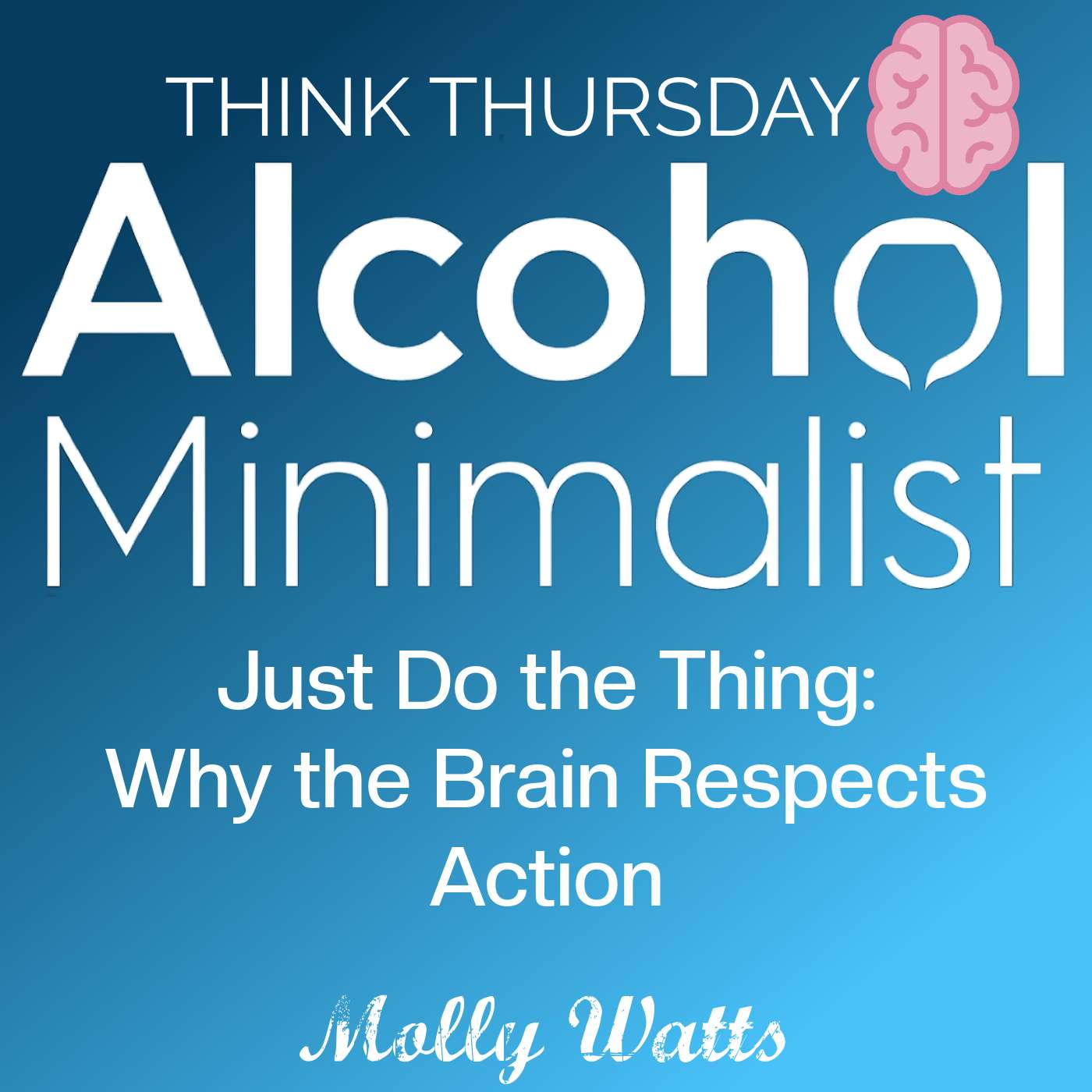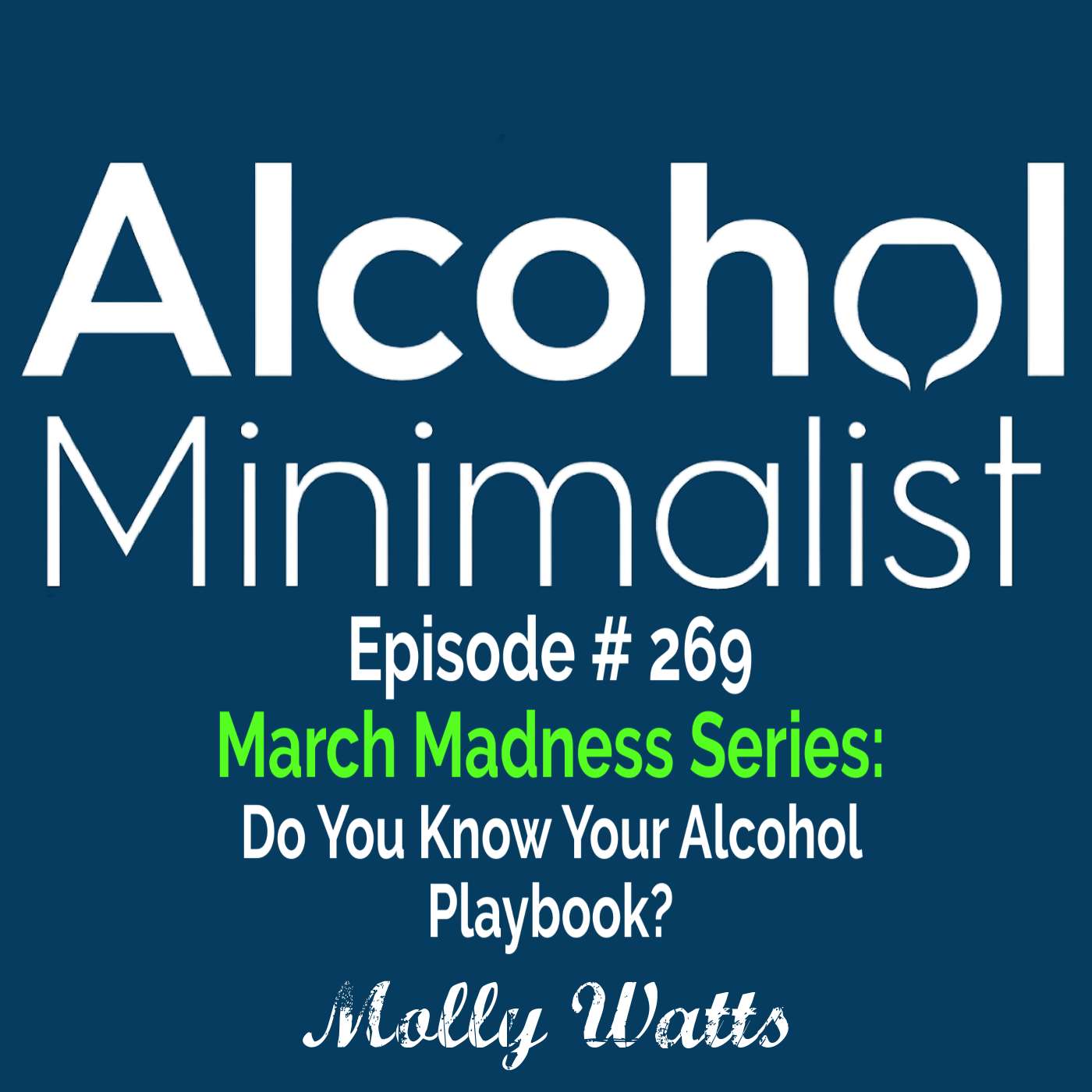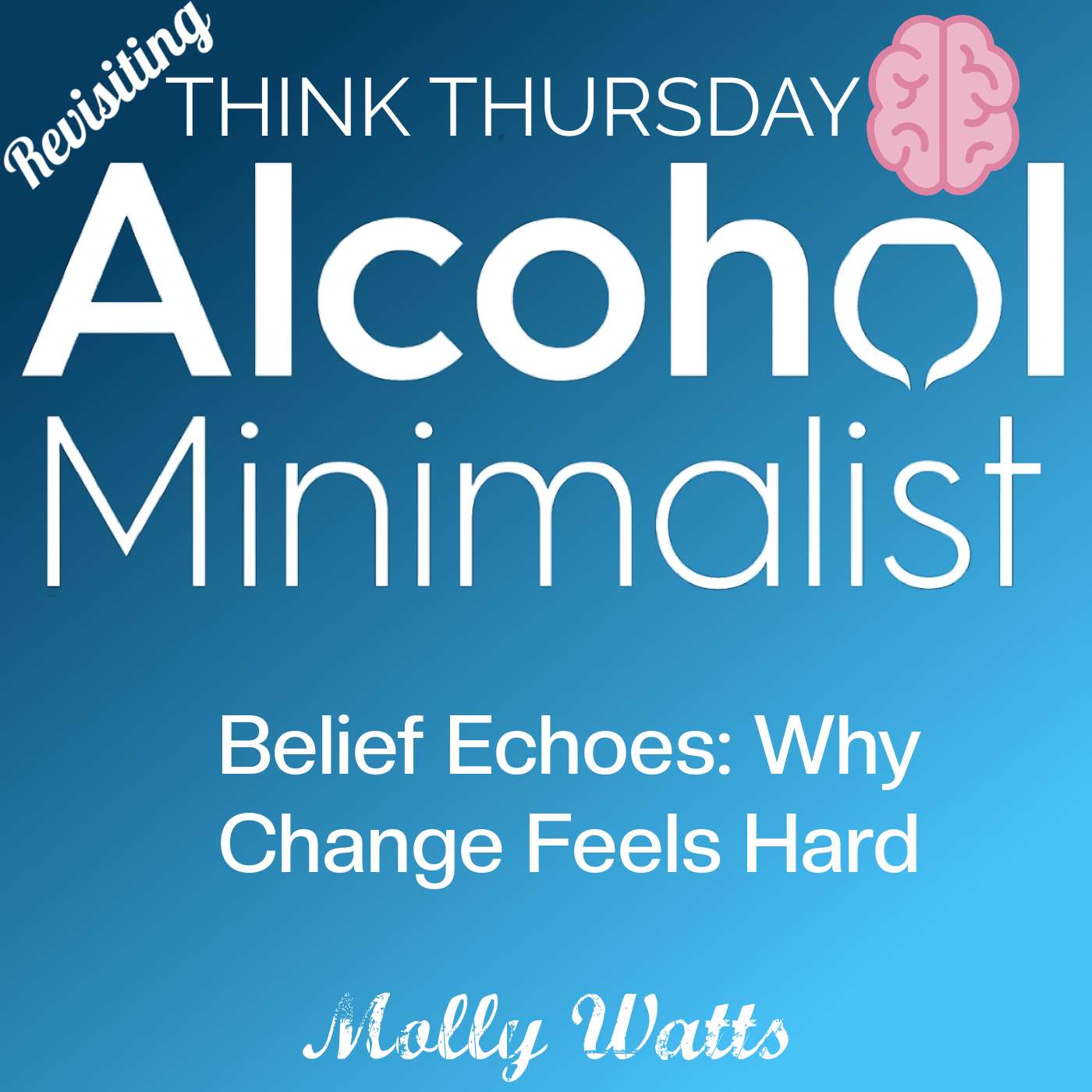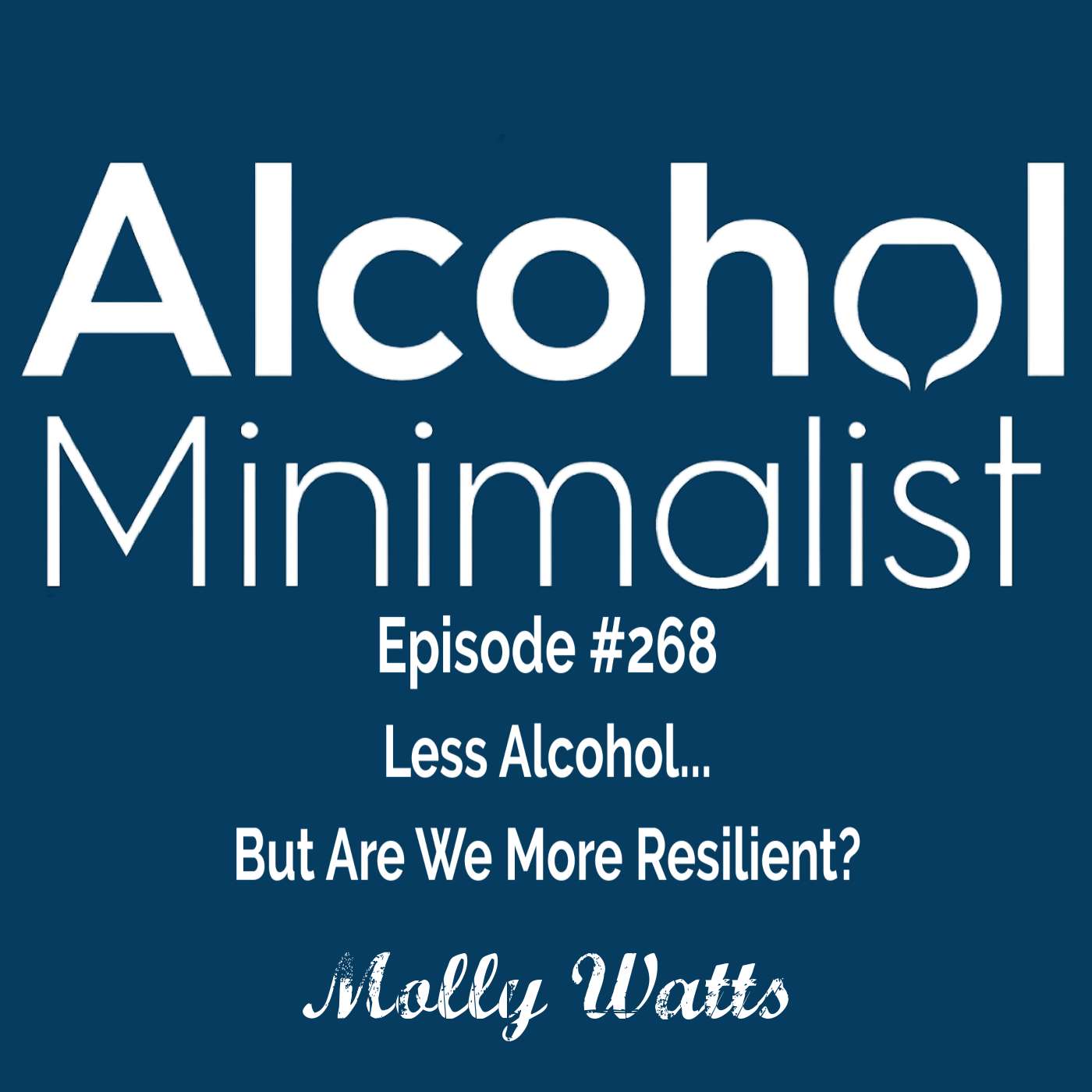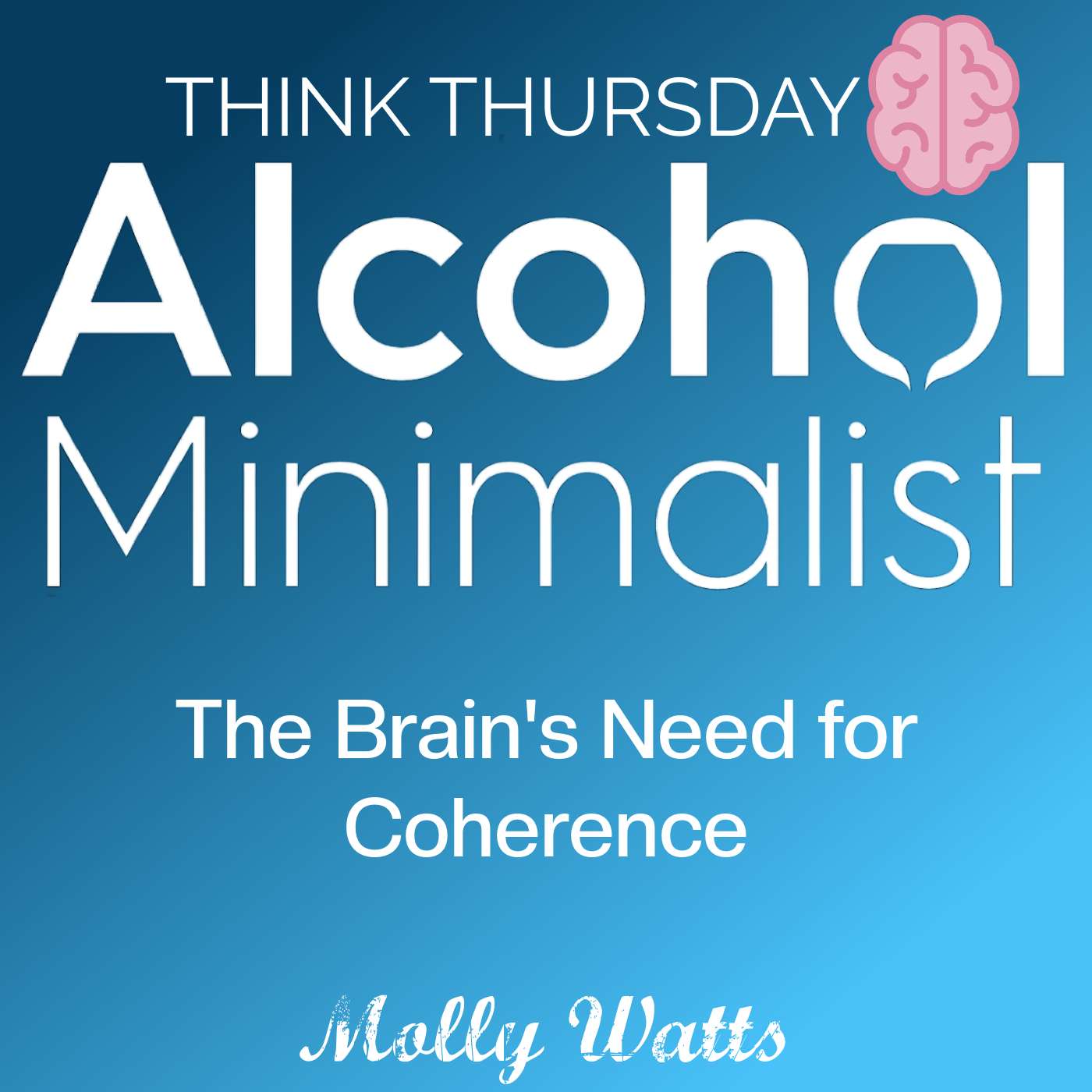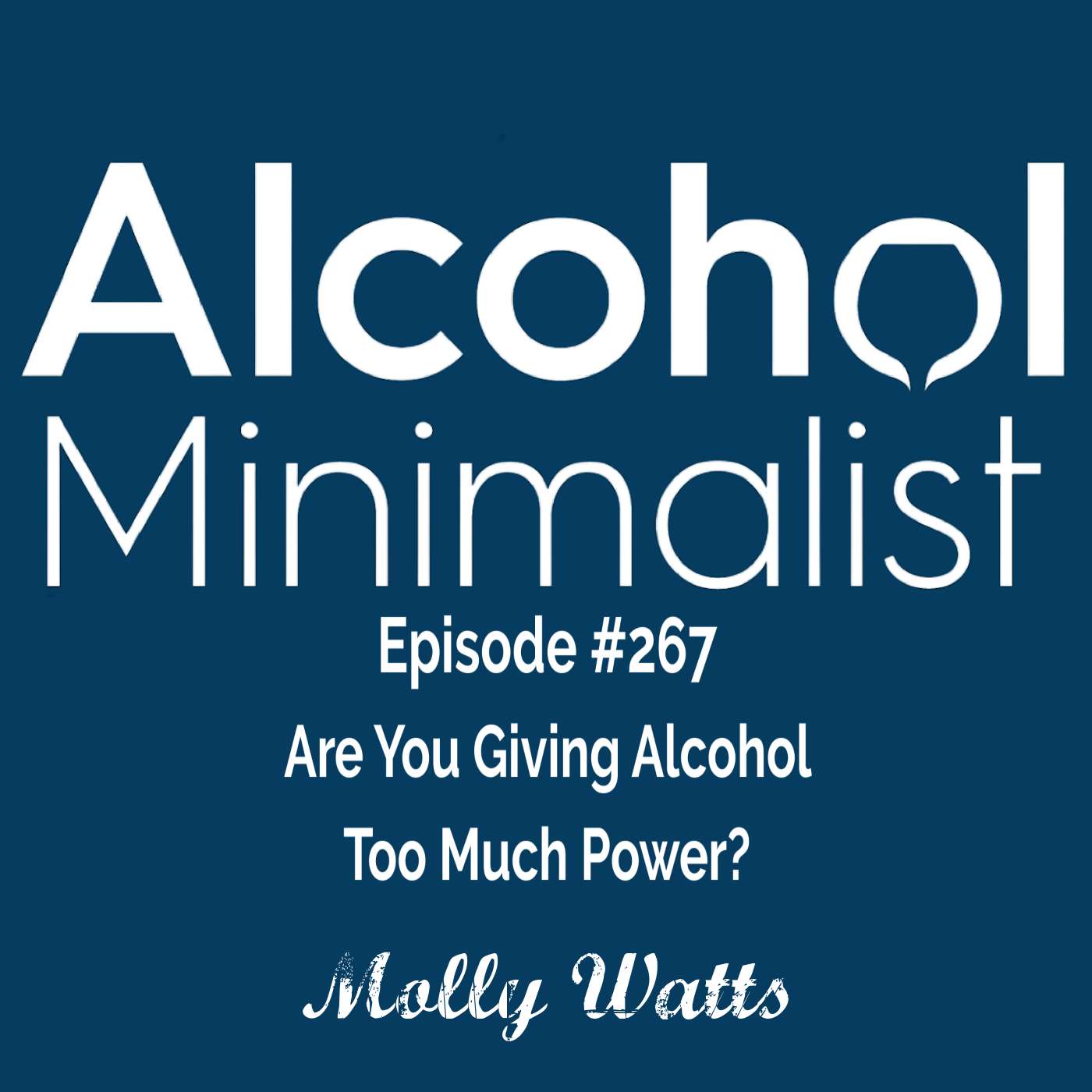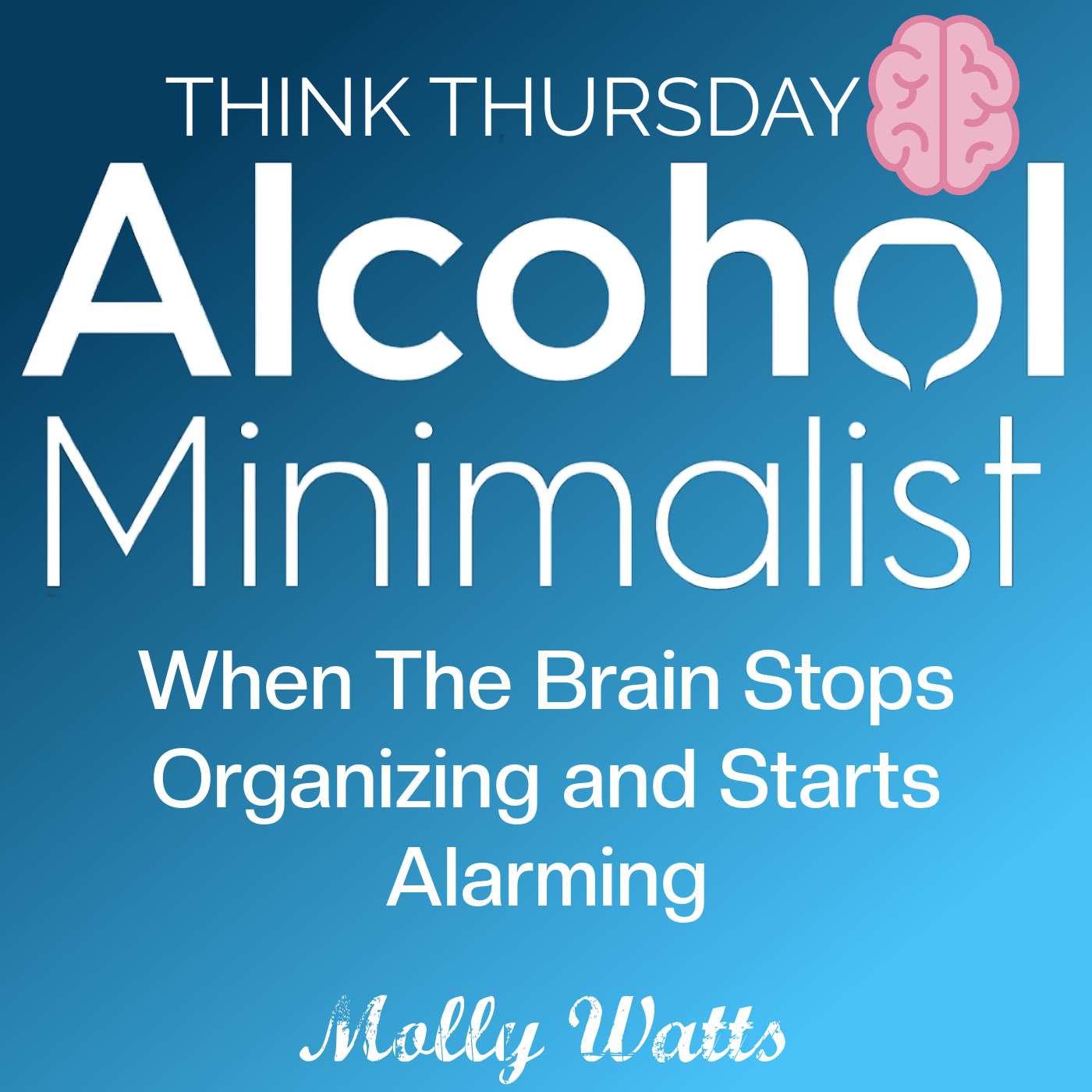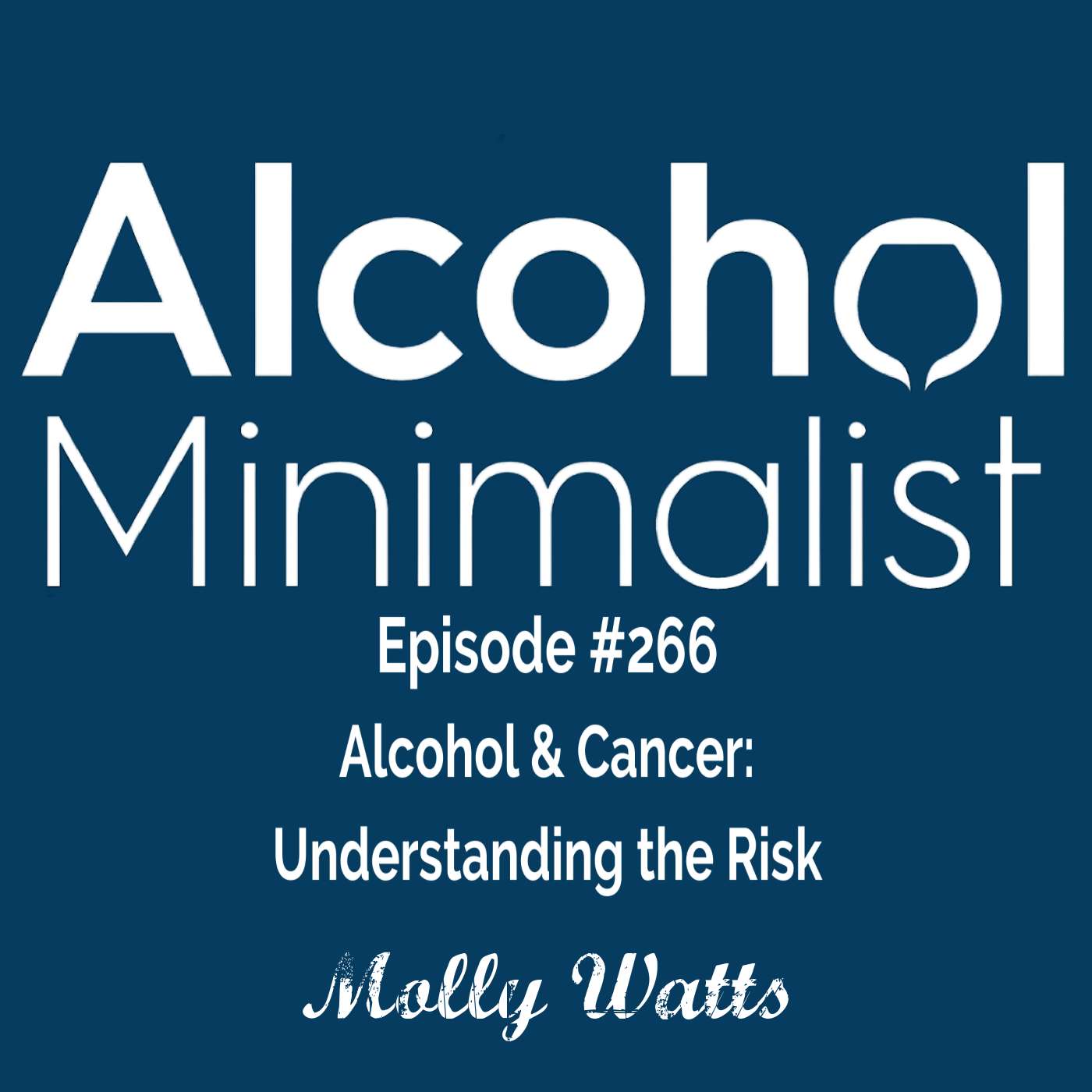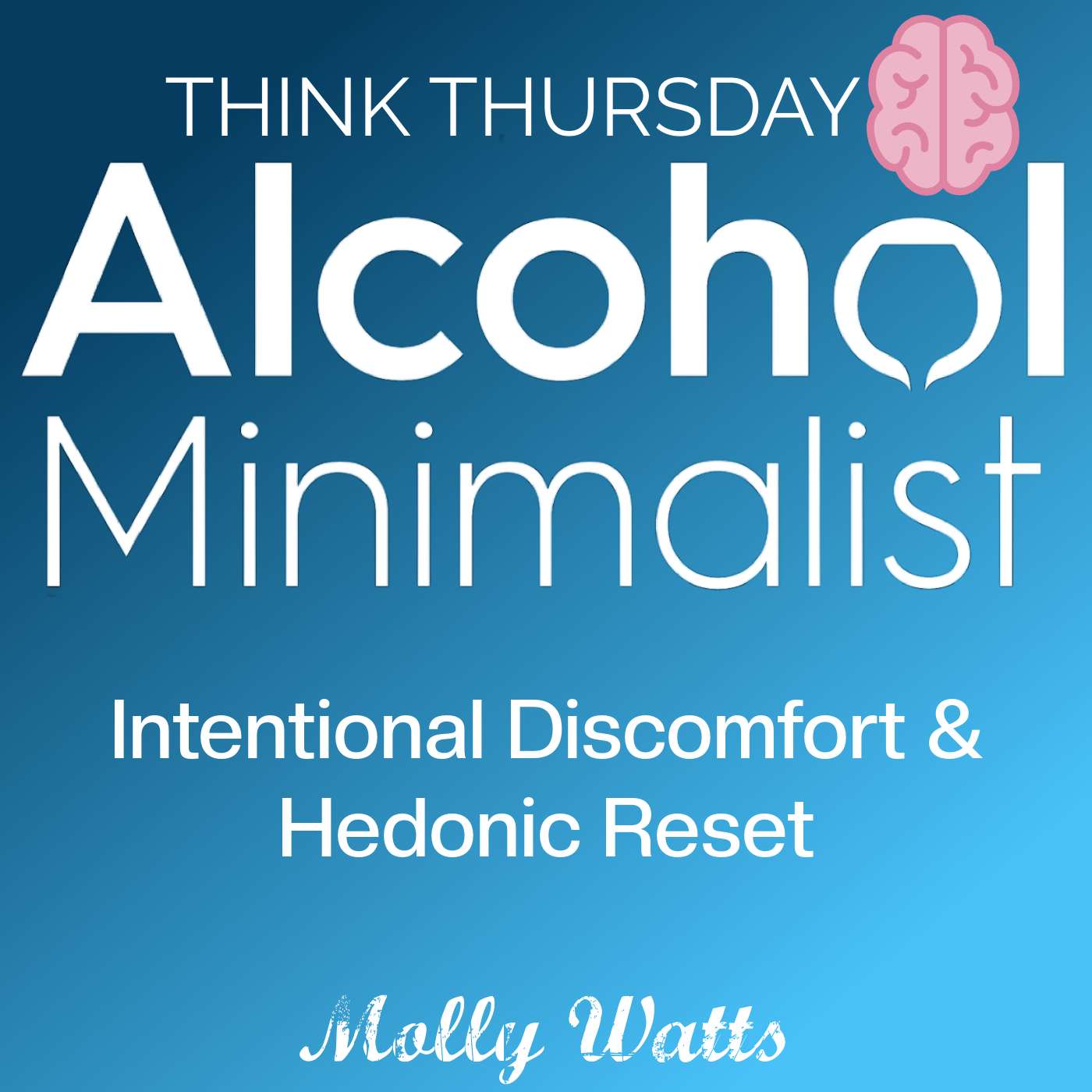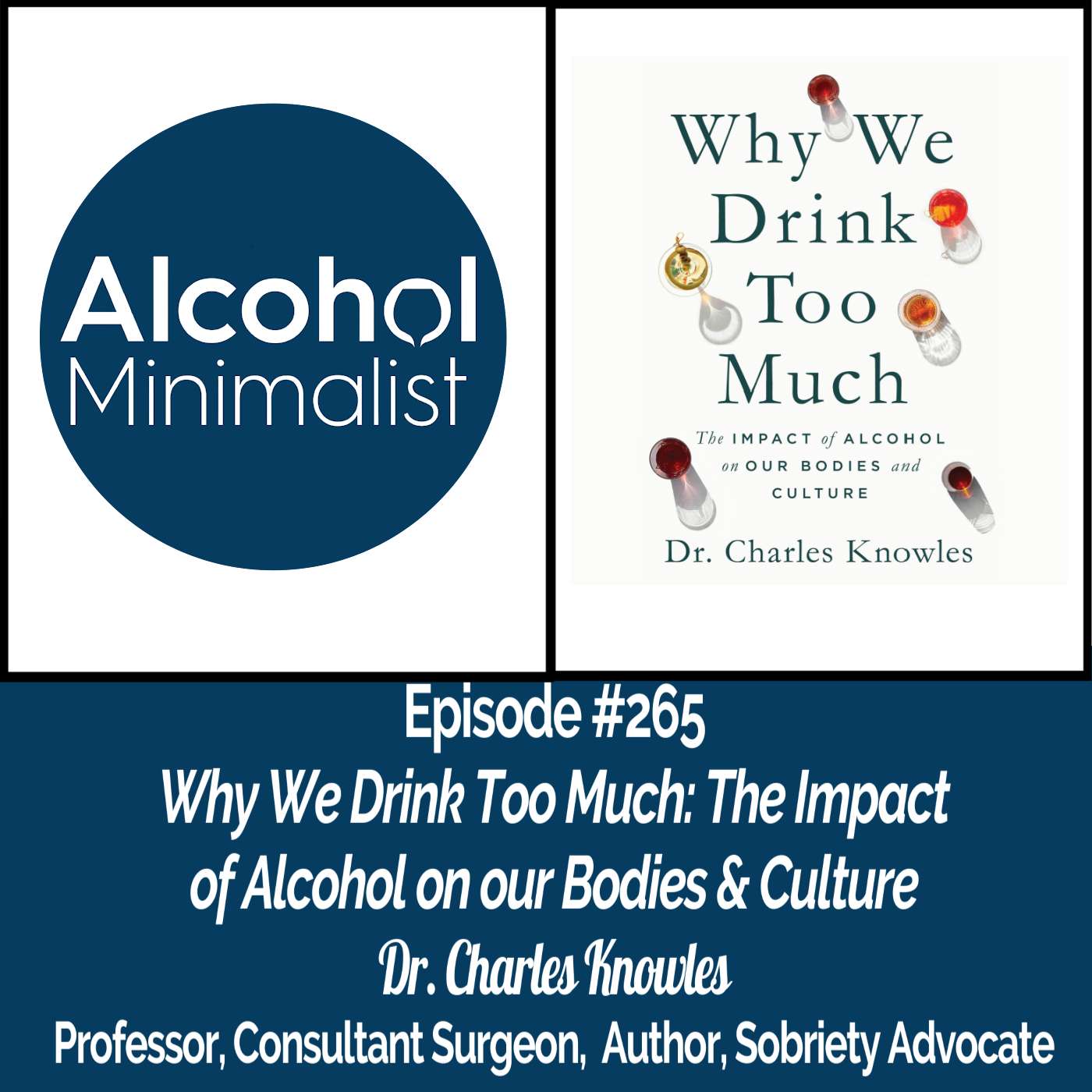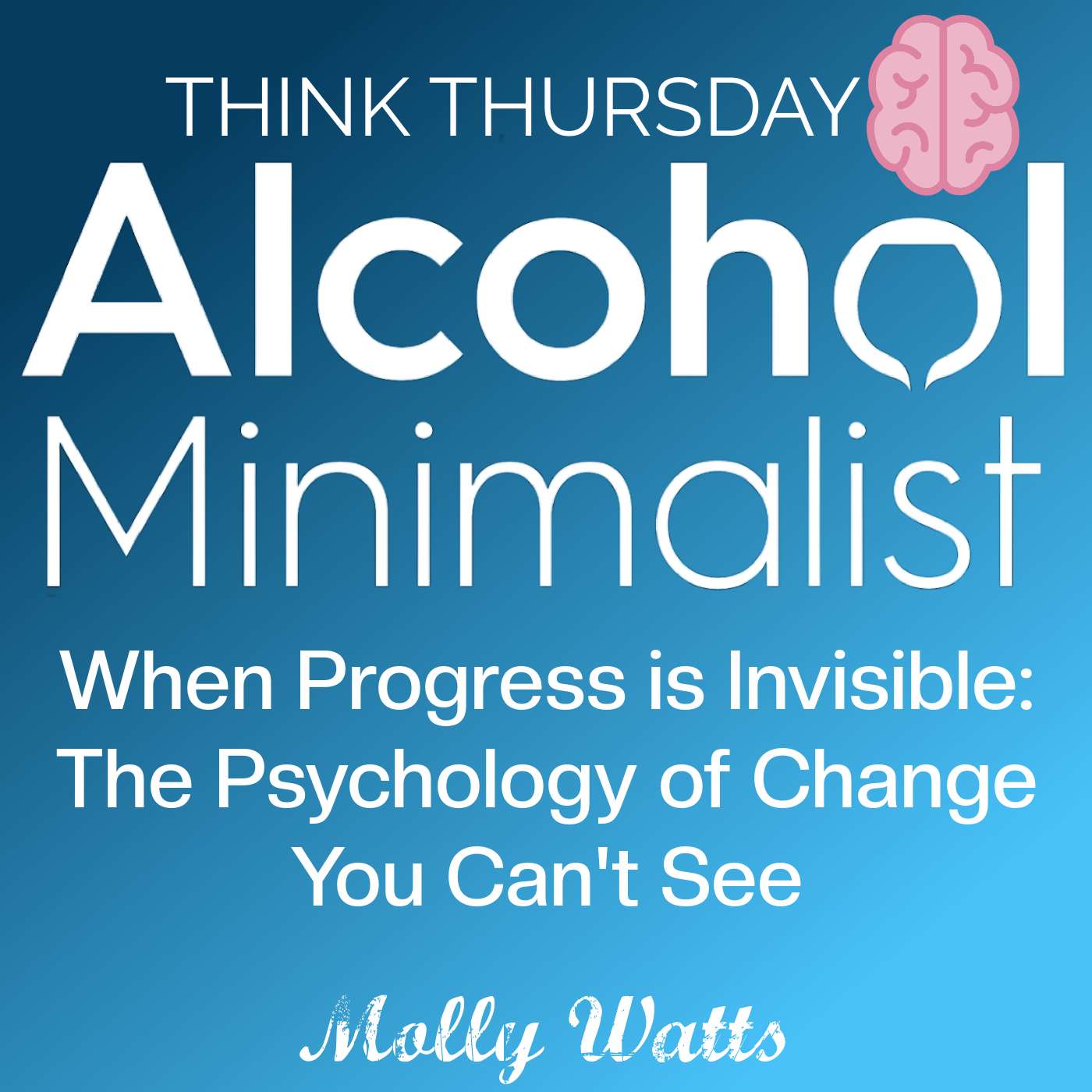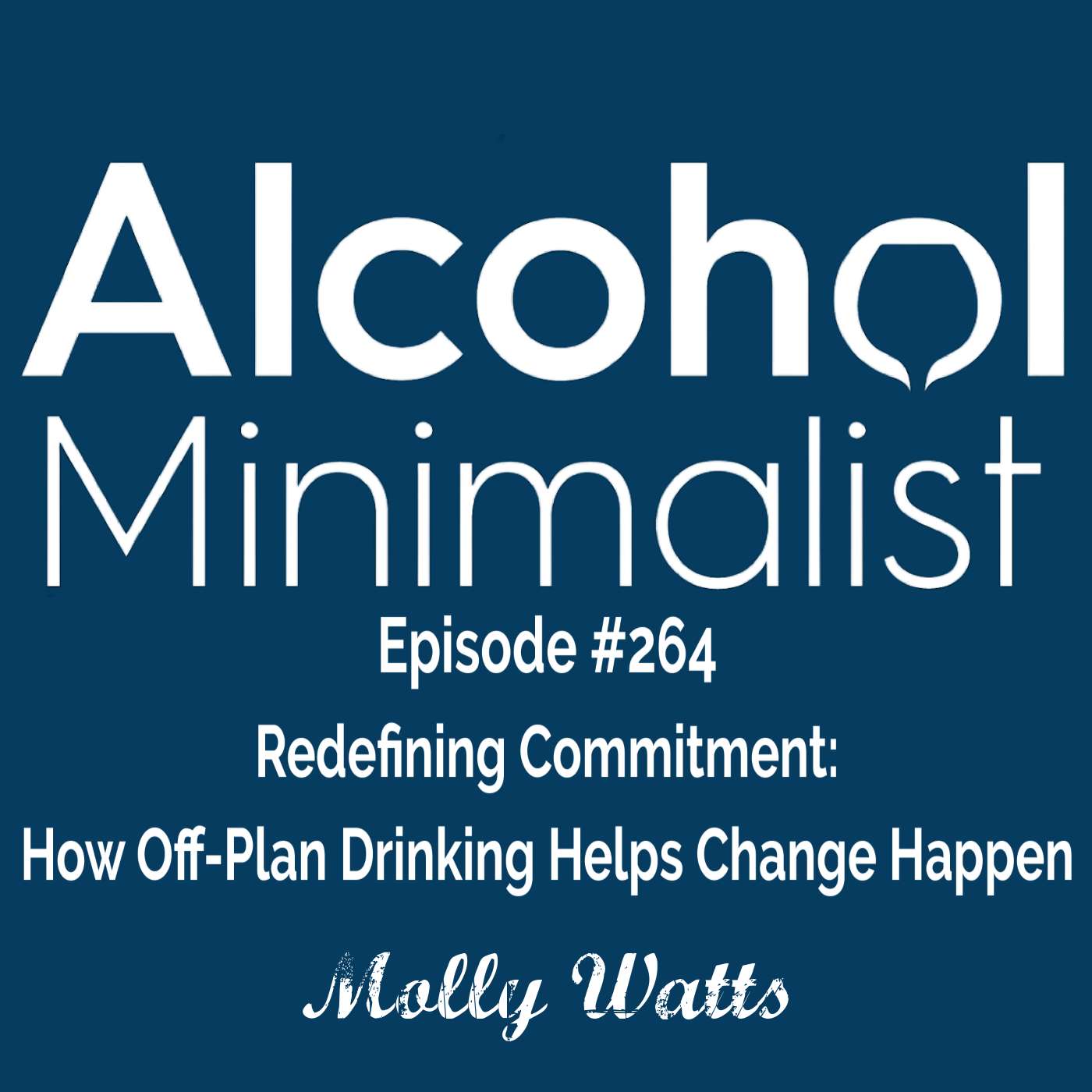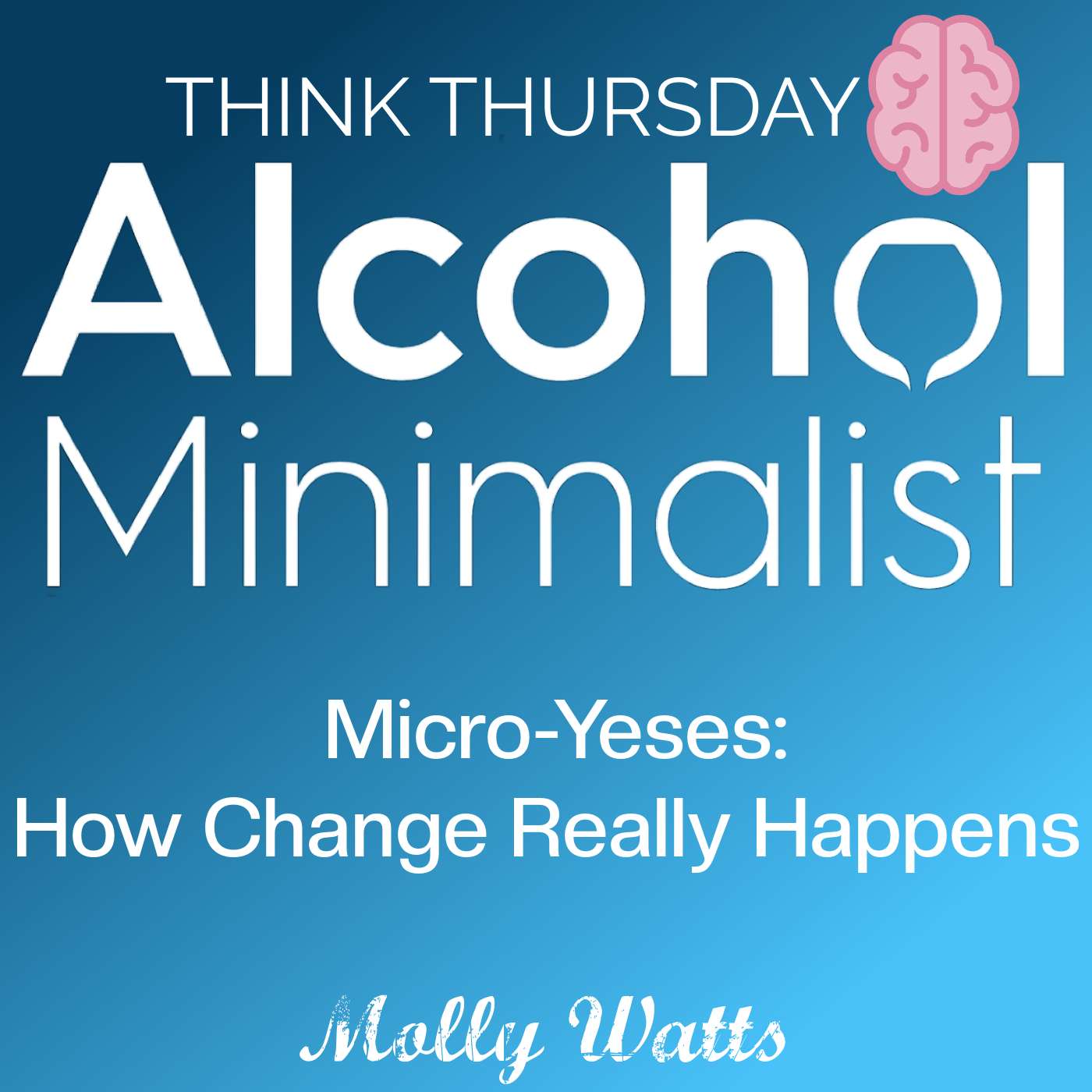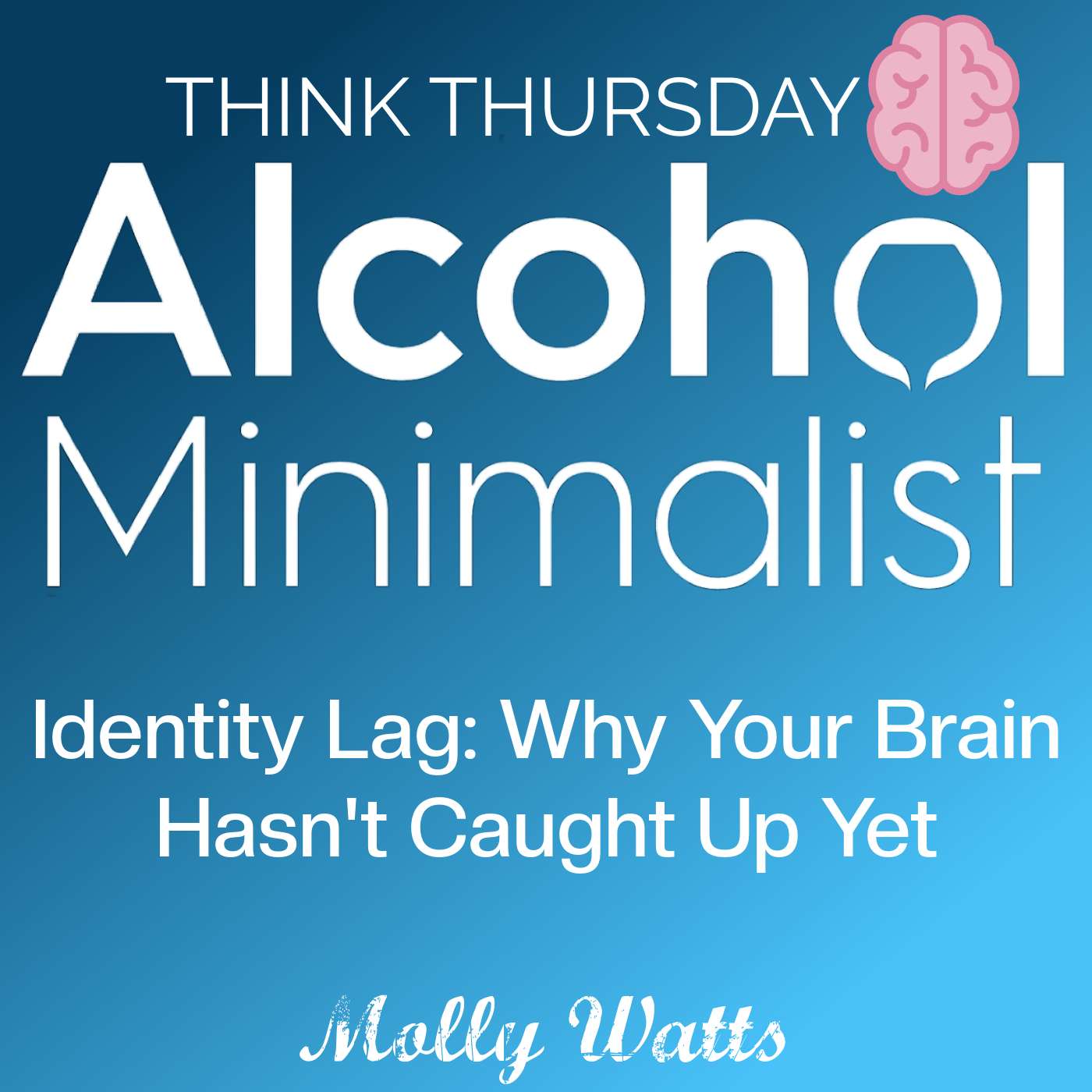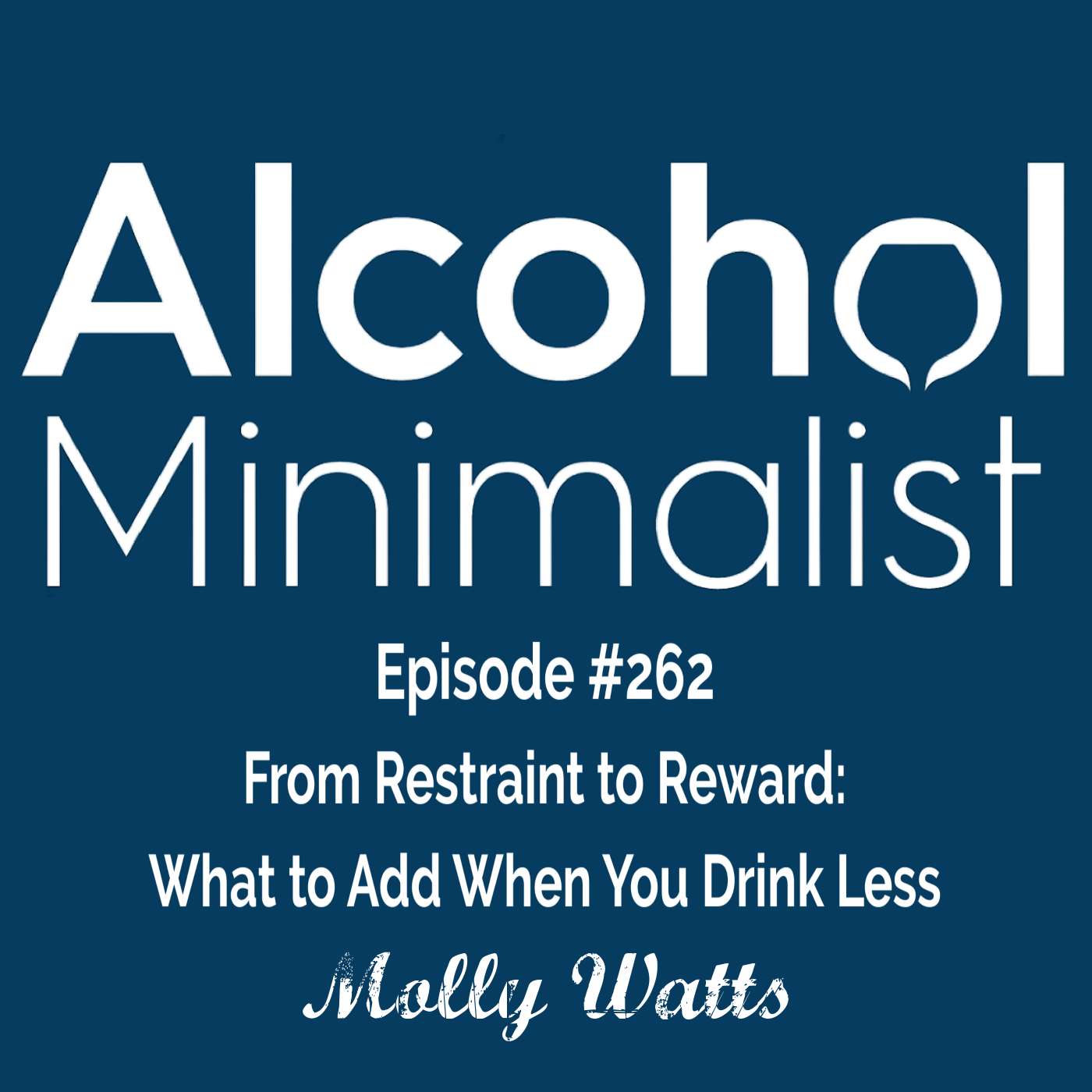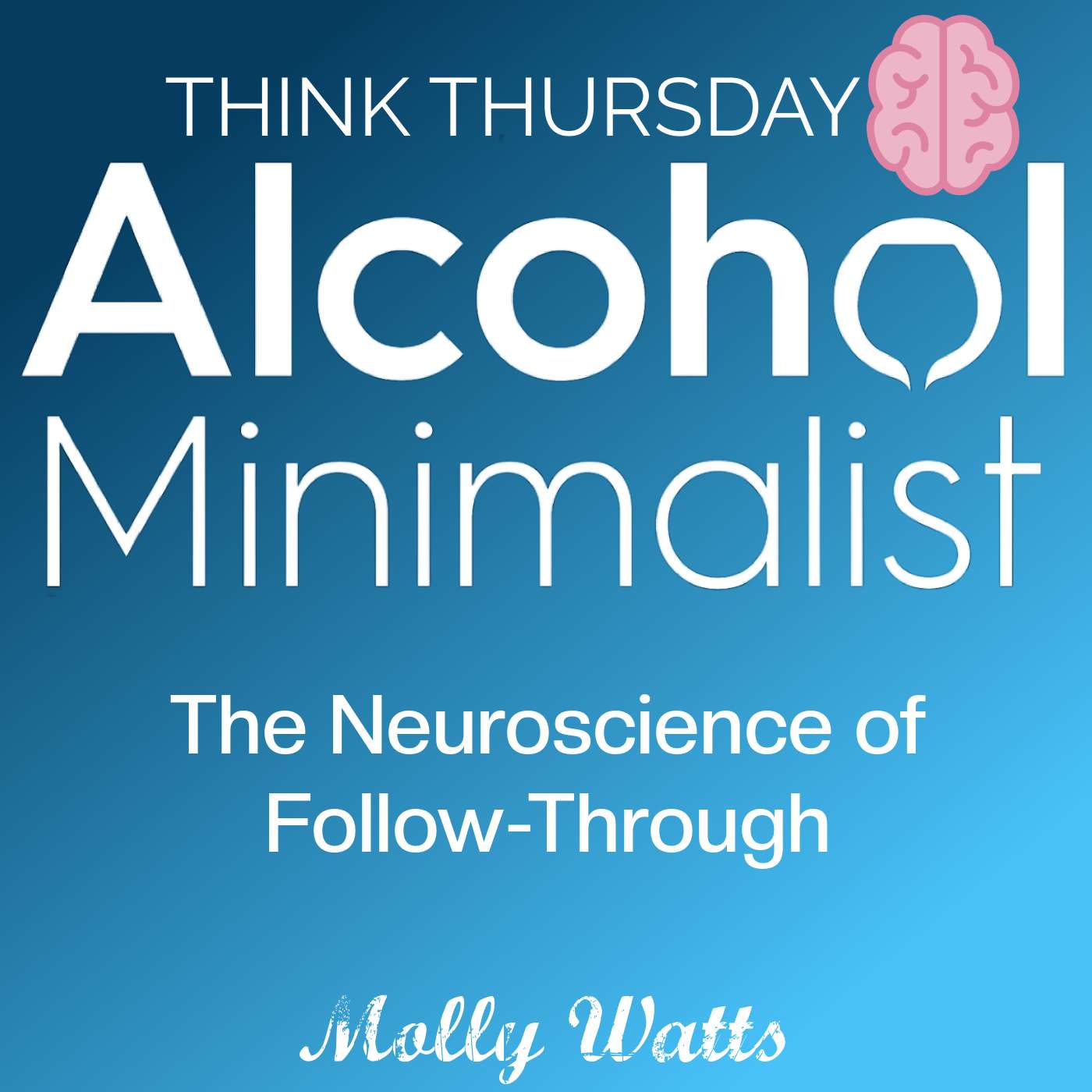Discover Alcohol Minimalist: Change Your Drinking Habits!
Alcohol Minimalist: Change Your Drinking Habits!

Alcohol Minimalist: Change Your Drinking Habits!
Author: Molly Watts, Author & Coach
Subscribed: 174Played: 10,147Subscribe
Share
©2023
Description
Change your relationship with alcohol without shame, guilt, or going sober. Join science-based coach Molly Watts to break habits and find peace through mindful drinking.
Hosted by author and coach Molly Watts, this show is for daily habit drinkers, adult children of alcoholics, and anyone stuck in the “gray area” of alcohol use.
Each episode blends neuroscience, behavior change psychology, and real-world strategies to help you build peace with alcohol — past, present, and future.
You’re not broken. You’re not powerless. You just need new tools.
Less alcohol. More life. Let’s do it together.
New episodes every Monday & Thursday.
Becoming an alcohol minimalist means:
Choosing how to include alcohol in our lives following low-risk guidelines.
Freedom from anxiety around alcohol use.
Less alcohol without feeling deprived.
Using the power of our own brains to overcome our past patterns and choose peace.
The Alcohol Minimalist Podcast explores the science behind alcohol and analyzes physical and mental wellness to empower choice. You have the power to change your relationship with alcohol, you are not sick, broken and it's not your genes!
This show is intended for educational purposes and does not constitute medical advice. If you are physically dependent on alcohol, please seek medical help to reduce your drinking.
Hosted by author and coach Molly Watts, this show is for daily habit drinkers, adult children of alcoholics, and anyone stuck in the “gray area” of alcohol use.
Each episode blends neuroscience, behavior change psychology, and real-world strategies to help you build peace with alcohol — past, present, and future.
You’re not broken. You’re not powerless. You just need new tools.
Less alcohol. More life. Let’s do it together.
New episodes every Monday & Thursday.
Becoming an alcohol minimalist means:
Choosing how to include alcohol in our lives following low-risk guidelines.
Freedom from anxiety around alcohol use.
Less alcohol without feeling deprived.
Using the power of our own brains to overcome our past patterns and choose peace.
The Alcohol Minimalist Podcast explores the science behind alcohol and analyzes physical and mental wellness to empower choice. You have the power to change your relationship with alcohol, you are not sick, broken and it's not your genes!
This show is intended for educational purposes and does not constitute medical advice. If you are physically dependent on alcohol, please seek medical help to reduce your drinking.
354 Episodes
Reverse
We all have something we keep saying we’ll do — take the trip, write the book, make the call, start the business.In this episode, Molly explores why dreaming feels productive (dopamine loves anticipation), but behavior is what actually builds identity. She revisits cognitive dissonance, explains the Zeigarnik effect, and shares a personal story about choosing to prioritize travel in 2025 — and how taking action created momentum.The message is simple: movement builds evidence. Evidence builds identity.In This EpisodeWhy anticipation activates dopamineHow cognitive dissonance quietly reshapes identityWhy behavior resolves tension more than belief doesThe Zeigarnik effect and “open loops” in the brainWhy readiness often follows actionA personal example of turning “someday” travel into real plansKey TakeawaysThe brain builds identity from evidence, not intentionDreaming feels good, but action stabilizes the nervous systemOpen loops consume mental energyConfidence is built through movementYou don’t need the whole plan — just the next visible stepBefore Monday rolls around, choose one thing you’ve been postponing and take one deliberate step toward it.Book it. Open it. Send it. Schedule it.Let your behavior do the convincing.
★ Support this podcast ★
In this March kickoff episode, Molly introduces a month-long basketball theme inspired by her childhood love of the game and the five life lessons she previously shared with her community. Drawing from her experience playing basketball she explores how the structure and strategy of the game mirror the patterned nature of drinking habits.The central message: before you can change your drinking, you have to understand your playbook.Molly explains how drinking often feels spontaneous and emotional, but when slowed down, reveals predictable thought patterns. Using personal examples from her own decades-long 6 p.m. “unwind play,” along with a client story about belonging and connection, she illustrates how automatic behaviors are not inevitable—they are practiced.The episode also dives into the neuroscience behind habit formation through the Behavior Map–Results Cycle (Thought → Feeling → Action → Result) and how Alcohol Core Beliefs reinforce repeated patterns. For listeners who grew up with alcohol in the home, Molly discusses how early modeling can shape unconscious associations without conscious awareness.The episode concludes with a guided “game film” exercise to help listeners identify the thoughts that precede their drinking urges and begin building awareness—the first and most essential skill for change.This is where agency begins.Why basketball isn’t random—and neither is your drinkingHow “automatic” behaviors differ from “inevitable” onesMolly’s personal 6 p.m. unwind pattern and how she rewired itThe Behavior Map–Results Cycle and the neuroscience of habit loopsA client example illustrating how belonging—not wine—was driving behaviorThe unique impact of growing up with an alcoholic parent on your internal playbookA guided reflection exercise to identify the thought that begins your drinking patternWhy awareness—not willpower—is the first step toward lasting changeKey ConceptsDrinking follows a predictable playbookAutomatic means practicedThought creates feeling, feeling drives actionYou cannot change what you do not examineShame is not a useful tool for changeAwareness is the first skillLow risk drinking guidelines from the NIAAA:Healthy men under 65:No more than 4 drinks in one day and no more than 14 drinks per week.Healthy women (all ages) and healthy men 65 and older:No more than 3 drinks in one day and no more than 7 drinks per week.One drink is defined as 12 ounces of beer, 5 ounces of wine, or 1.5 ounces of 80-proof liquor. So remember that a mixed drink or full glass of wine are probably more than one drink.Abstinence from alcoholAbstinence from alcohol is the best choice for people who take medication(s) that interact with alcohol, have health conditions that could be exacerbated by alcohol (e.g. liver disease), are pregnant or may become pregnant or have had a problem with alcohol or another substance in the past.Benefits of “low-risk” drinkingFollowing these guidelines reduces the risk of health problems such as cancer, liver disease, reduced immunity, ulcers, sleep problems, complications of existing conditions, and more. It also reduces the risk of depression, social problems, and difficulties at school or work.
★ Support this podcast ★
When Change Feels Hard: Understanding “Belief Echoes”In this episode of Think Thursday, Molly revisits a powerful concept at the heart of behavior change—belief echoes. If you’ve ever told yourself, “Change is just hard for me” or “I’m not someone who sticks with things,” this episode will help you understand what’s actually happening in your brain—and why you’re not broken.Grounded in neuroscience and mindset work, Molly explains why lasting change isn’t about willpower. It’s about the thoughts you’ve practiced for years without realizing it.What You’ll Learn1. What a “Belief Echo” IsA belief echo is a thought you’ve repeated so often that it no longer feels like a thought—it feels like truth.Statements like:“This is just who I am.”“I never follow through.”“I’m not consistent.”These aren’t facts. They’re rehearsed mental patterns.2. Why Your Brain Protects Limiting BeliefsYour brain is a pattern-recognition machine. It craves familiarity—even when that familiarity is painful. Through confirmation bias, it selectively gathers evidence that supports your existing identity.If you believe you “never stick with things,” your brain will:Highlight every time you quitDownplay or ignore times you followed throughStore that “evidence” to reinforce the beliefIt’s not sabotage. It’s efficiency.3. The Real Reason Change Feels HardChange feels hard because you’re asking your brain to:Let go of a familiar identityBelieve something new before you have proofYou must interrupt an old belief before you have evidence of the new one.That gap is where discomfort lives.4. Change Takes Thinking TimeWe often say “change takes time,” but what it really takes is intentional thinking time.New belief → practiced repeatedly → new feelings → new actions → new results.You don’t build evidence first. You build belief first.5. A Practical ExampleOld belief: “I never stick with things.” New thought to practice: “I am learning how to follow through.”That subtle shift:Reduces shameCreates possibilityOpens the door to consistent actionSmall, believable thoughts are how identity shifts begin.The Science Behind ItThis episode reinforces foundational Alcohol Minimalist principles found in Breaking the Bottle Legacy , including:The Behavior Map-Results CycleCognitive behavioral principlesConfirmation bias researchThe Think-Feel-Act frameworkAt its core: Your drinking behavior is never random. It is driven by thought.Key TakeawaysYou are not failing at change.You are experiencing the momentum of well-practiced thoughts.Beliefs are not identity—they are rehearsed sentences.Sustainable change starts with choosing a new sentence on purpose.Your brain can learn a new identity—but only through repetition.Reflection QuestionsWhat sentences about yourself are you reinforcing daily?What belief echo might be quietly driving your drinking?What is one small, believable thought you could begin practicing today?Change begins with noticing the story you’re telling about who you are.What belief echo do you suspect might be operating in the background of your drinking right now?
★ Support this podcast ★
Alcohol consumption in the United States is declining. Gallup reports that only 54% of Americans now drink — the lowest level recorded in decades — and nearly half of Americans say they are actively trying to drink less.On the surface, this sounds like clear progress.But in this episode, Molly explores an important question raised by Dr. Adi Jaffe in a recent article: Are we truly becoming more emotionally resilient… or are we simply swapping one escape route for another?As cannabis use rises alongside declining alcohol consumption, it’s worth examining whether substitution equals transformation — or whether real change requires something deeper.This episode unpacks the cultural shift away from alcohol, the rise in cannabis use, and the critical distinction between behavioral change and emotional growth.In This Episode, You’ll Learn:The latest statistics on declining alcohol consumption in the U.S.Why cannabis use is increasing as alcohol use declinesWhat research says about cannabis use and alcohol reductionThe difference between substitution and emotional resilienceWhy simply replacing alcohol doesn’t necessarily change your relationship with discomfortHow psychological dependence operates beneath surface-level behavior changeThe core beliefs that often drive alcohol useA simple self-reflection exercise to assess your own coping patternsKey Statistics Discussed54% of Americans report drinking alcohol (Gallup 2025)Nearly half of Americans are trying to drink less65% of Gen Z plans to cut down or abstain from alcoholApproximately 178,000 alcohol-related deaths occur annually in the U.S.41% of young adults report cannabis use in the past year29% report past-month cannabis use10.8% report daily cannabis useAbout 3 in 10 cannabis users are at risk of Cannabis Use DisorderThe Core QuestionReducing alcohol is meaningful.But emotional resilience is something deeper.This episode challenges you to consider:If alcohol disappeared tomorrow, what would you reach for?Are you choosing relaxation — or needing escape?Have your behaviors changed… or have your beliefs changed?True transformation happens when you dismantle the belief that you need something outside of yourself to manage your internal state.Resources MentionedDr. Adi JaffeThe Abstinence Myth by Dr. Adi JaffeUnhooked by Dr. Adi JaffeSunnyside mindful drinking app (15-day free trial available)Monitoring the Future (University of Michigan)CDC Cannabis Use DataHarvard Health on cannabis vs. alcohol risksBrown University study on cannabis and alcohol consumptionLow risk drinking guidelines from the NIAAA:Healthy men under 65:No more than 4 drinks in one day and no more than 14 drinks per week.Healthy women (all ages) and healthy men 65 and older:No more than 3 drinks in one day and no more than 7 drinks per week.One drink is defined as 12 ounces of beer, 5 ounces of wine, or 1.5 ounces of 80-proof liquor. So remember that a mixed drink or full glass of wine are probably more than one drink.Abstinence from alcoholAbstinence from alcohol is the best choice for people who take medication(s) that interact with alcohol, have health conditions that could be exacerbated by alcohol (e.g. liver disease), are pregnant or may become pregnant or have had a problem with alcohol or another substance in the past.Benefits of “low-risk” drinkingFollowing these guidelines reduces the risk of health problems such as cancer, liver disease, reduced immunity, ulcers, sleep problems, complications of existing conditions, and more. It also reduces the risk of depression, social problems, and difficulties at school or work.
★ Support this podcast ★
In this week’s Think Thursday, Molly builds on last week’s conversation about overwhelm and takes it one level deeper—into uncertainty and the brain’s fundamental need for coherence.Many people say, “I’m overwhelmed by everything.” But often, what they’re describing isn’t simply busyness. It’s destabilization. The pace of technological change, the relentless news cycle, economic uncertainty, global conflict, and cultural instability create a steady stream of input that the human brain was not designed to process.Our brains evolved for village-level information flow—not constant global exposure in real time.The Brain as a Prediction MachineModern neuroscience describes the brain as a prediction engine. Researchers such as Karl Friston (predictive processing theory) suggest that the brain’s primary job is not just to react to reality, but to anticipate it.Your brain is constantly generating internal forecasts about what is likely to happen next. It builds models of what is safe, familiar, and probable. When those models align with experience, the brain operates efficiently. Monitoring decreases. Stress drops. Calm increases.But when prediction fails—when the future feels unstable or unclear—the brain increases vigilance. Cortisol rises. The amygdala becomes more reactive. Monitoring intensifies.Uncertainty is not just emotionally uncomfortable. It is neurologically expensive.Research comparing predictable and unpredictable stressors shows that unpredictable stress can create stronger physiological responses than predictable stress—even when the predictable stressor is objectively worse. The brain often prefers a known negative outcome to an unknown one because predictability allows preparation, and preparation reduces perceived threat.Coherence vs. AmbiguityResearchers such as Travis Proulx and Steven Heine have explored how disruptions in meaning and narrative coherence increase anxiety and motivate the brain to restore order. Coherence stabilizes the nervous system. Ambiguity destabilizes it.When someone says, “I’m overwhelmed by everything,” that word everything represents a collapse of hierarchy and narrative. The brain cannot model everything at once. It cannot prioritize everything simultaneously. So it defaults to alarm.Language plays a powerful role here. Molly revisits her recent quote:“Every time you replace ‘I’m overwhelmed’ with ‘I need to decide what matters most and go slow,’ your brain stops firing alarm signals and starts organizing information again.”While this shift does not immediately shut down the amygdala, research on cognitive reappraisal by psychologist James Gross shows that reframing increases prefrontal cortex activity and decreases amygdala activation over time. Changing language changes the predictive model the brain uses.Molly also revisits a core Alcohol Minimalist concept: thoughts are both descriptive and prescriptive. Repeating “I’m overwhelmed” reinforces a future expectation. The brain uses repeated thoughts as data. Language influences prediction.Why This Feels Amplified NowThe modern nervous system is metabolizing more information than at any point in human history. Our brains evolved to monitor a small social circle, not global crises, economic forecasts, political unrest, and technological revolutions delivered instantly.When input exceeds the brain’s capacity to construct stable models:Uncertainty risesScanning increasesStress increasesCognitive flexibility decreasesThis is not fragility. It is neurobiology.And it has direct implications for behavior change.The brain invests effort when it believes the future is navigable. When the future feels chaotic, it shifts toward short-term safety behaviors—scrolling, avoidance, comfort-seeking, and returning to familiar habits—not because discipline has disappeared, but because predictability feels safer than uncertainty. Coherence builds confidence. Confidence supports effort. Effort sustains behavior change.When coherence drops, consistency often drops with it.Five Ways to Restore CoherenceWhile you cannot eliminate global uncertainty, you can restore local coherence. The brain does not require certainty everywhere. It requires stability somewhere.Here are five actionable steps:Narrow the time horizon.Focus on today or tomorrow rather than the entire month or year. Short predictive loops are easier for the brain to manage.Identify what is controllable.Research shows perceived control reduces amygdala activation. Even one controllable action restores agency.Establish one predictable ritual.A consistent morning routine, defined work block, or nightly wind-down creates stability the brain can model.Limit interpretive overload.Too many possible explanations increase cognitive load. Choose the most useful interpretation instead of entertaining every hypothetical scenario.Build one daily evidence loop.Follow through on one manageable commitment each day. Predictable behavior strengthens the brain’s trust in its own forecasting.Each of these steps restores hierarchy. Each reduces prediction error. Each sends a stabilizing signal to the nervous system.You are telling your brain: “The world may be uncertain, but my behavior has structure.”The Bottom LineYour brain does not require absolute certainty in order to function well. It requires enough pattern to feel oriented. Enough structure to reduce constant monitoring. Enough stability to believe its predictions will not be continuously disrupted.You cannot calm the entire world. But you can restore order in your immediate sphere.When coherence returns, clarity follows.
★ Support this podcast ★
On this episode of The Alcohol Minimalist Podcast, Molly reflects on what would have been her mother’s 95th birthday and the years lost not only at the end of her life, but throughout decades spent in active addiction. With compassion and clarity, she explores the difference between alcohol dependence and alcohol reliance, and why that distinction matters more than most people realize.Drawing from her recent conversation with Dr. Charles Knowles , Molly breaks down the difference between the small percentage of adults who are physically dependent on alcohol and the much larger group who fall into gray area drinking or alcohol reliance. She explains how neuroadaptation occurs over time, how reinforced thought patterns shape behavior, and why learned helplessness can quietly keep people stuck.This episode is not about blame. It is about progression, influence, and the hopeful reality that most people questioning their drinking are not powerless. Through science, reflection, and practical questions, Molly invites listeners to examine the beliefs that may be giving alcohol more authority than it actually has.In This Episode:Reflecting on the years lost to active addictionThe difference between alcohol dependence and alcohol relianceThe 2 to 3 percent statistic on physical dependenceThe 20 percent gray area drinking categoryHow neuroadaptation and tolerance develop over timeDopamine as a learning signal, not just a pleasure chemicalCue conditioning and incentive salienceThe psychology of learned helplessnessWhy belief shapes behavior and behavior reinforces beliefAlcohol’s health risks, including cancer and sleep disruptionWhy low risk drinking guidelines reduce harm, not riskThe importance of examining your belief system around alcoholKey Takeaways:Physical dependence develops gradually through repeated reinforcement and neuroadaptation.Most people questioning their drinking are not physically dependent but are operating in reinforced patterns.Alcohol influences the brain but does not automatically remove agency unless long term dependence has shifted the baseline.Beliefs such as “Once I start, I can’t stop” can strengthen neural expectation and reduce effort.Small cognitive shifts precede behavioral shifts, and repeated behavior reshapes the brain.Questions to Reflect On This Week:What belief about alcohol might you be carrying that deserves closer examination?Is there a sentence you repeat internally such as “I need it to relax” or “It helps me connect” that feels solid and unquestioned?What might happen if you approached that belief with curiosity rather than judgment?What is one small step you can take this week to observe rather than act automatically?Resources Mentioned:Molly’s interview with Dr. Charles Knowles Alcohol Truths: How Much Is Too Much?If you are questioning your relationship with alcohol, remember that awareness is the first step. Change does not require a dramatic declaration. It begins with curiosity, clarity, and small shifts practiced steadily over time.Low risk drinking guidelines from the NIAAA:Healthy men under 65:No more than 4 drinks in one day and no more than 14 drinks per week.Healthy women (all ages) and healthy men 65 and older:No more than 3 drinks in one day and no more than 7 drinks per week.One drink is defined as 12 ounces of beer, 5 ounces of wine, or 1.5 ounces of 80-proof liquor. So remember that a mixed drink or full glass of wine are probably more than one drink.Abstinence from alcoholAbstinence from alcohol is the best choice for people who take medication(s) that interact with alcohol, have health conditions that could be exacerbated by alcohol (e.g. liver disease), are pregnant or may become pregnant or have had a problem with alcohol or another substance in the past.Benefits of “low-risk” drinkingFollowing these guidelines reduces the risk of health problems such as cancer, liver disease, reduced immunity, ulcers, sleep problems, complications of existing conditions, and more. It also reduces the risk of depression, social problems, and difficulties at school or work.
★ Support this podcast ★
Many people are saying the same thing lately: “I’m overwhelmed by everything.”In this Think Thursday episode, Molly explores what overwhelm actually is from a neuroscience perspective. Is it just busyness? Or is something deeper happening in the brain?Drawing from research on the amygdala, stress hormones, working memory, and executive function, Molly explains how overwhelm is not about volume alone. It is about perceived overload and a loss of prioritization. When the brain detects too many competing demands and not enough resources, it shifts from organizing to alarming.This episode also revisits a recent WisdomWednesday quote about replacing “I’m overwhelmed” with “I need to decide what matters most and go slow.” Molly clarifies why that statement is directionally true but not neurologically instant. She explains how language influences prediction, prediction shapes physiology, and physiology drives behavior.What You’ll LearnWhy overwhelm is a perception of overload, not simply busynessHow the amygdala flags cognitive threatWhat happens to the prefrontal cortex under stressWhy everything feels urgent when executive function is compromisedThe difference between descriptive and prescriptive thoughtsHow repeating “I’m overwhelmed” reinforces neural prediction loopsWhy prioritization restores cognitive flexibilityHow cognitive reappraisal shifts neural activity over timeKey Concepts ExplainedPerceived Overload Overwhelm occurs when the brain interprets demands as exceeding available resources.Amygdala Activation When ambiguity, uncertainty, and competing priorities rise, the amygdala signals threat, increasing stress hormones like cortisol and norepinephrine.Executive Function The prefrontal cortex is responsible for planning, sequencing, prioritizing, and organizing. Under stress, its efficiency decreases.Descriptive vs Prescriptive Thinking Some thoughts label experience. Others shape future experience. Repeating “I’m overwhelmed” reinforces prediction patterns that sustain the feeling.Cognitive Reappraisal Research shows that reinterpreting a situation increases prefrontal cortex activity and decreases amygdala activation over time.Why Language MattersWhen you repeatedly say “I’m overwhelmed,” your brain begins scanning for confirming evidence. Increased vigilance raises stress. Stress reduces clarity. Reduced clarity reinforces overwhelm.Replacing that statement with a prioritizing phrase does not instantly shut down the alarm system. However, it recruits executive function and begins shifting neural activity toward organization and task-based thinking.Language guides prediction. Prediction guides physiology. Physiology guides behavior.Practical ReframeInstead of:“I’m overwhelmed.”Try:What matters most today?What is the next smallest step?What can wait?This is not positive thinking. It is restoring organizing capacity.Overwhelm signals that prioritization has collapsed. Prioritization is a skill that can be strengthened.Behavior Change ConnectionPeople often abandon habits when they feel overwhelmed, not because they lack discipline, but because executive function is compromised.You cannot build new neural pathways from a chronically alarmed state.Restoring order supports follow-through.
★ Support this podcast ★
Last week marked World Cancer Day, and in this episode, Molly revisits an important—and often misunderstood—topic: the relationship between alcohol and cancer.This is not a new conversation, and it’s not a reaction to headlines. Instead, it’s part of an ongoing commitment to helping you understand the science well enough to make informed, intentional choices about alcohol—without fear, shame, or all-or-nothing thinking.One reason this topic continues to matter is a striking gap in awareness: while nearly 90% of adults recognize smoking as a cancer risk, fewer than half realize that alcohol is also classified as a carcinogen Project 1 (50). That lack of awareness makes informed choice difficult—and that’s what this episode aims to address.In this episode, you’ll learn:Why alcohol is classified as a Group 1 carcinogen, and what that designation actually meansThe seven types of cancer that are clearly linked to alcohol use, including breast cancerHow alcohol increases cancer risk at a biological level (acetaldehyde, inflammation, hormones, and nutrient disruption)Why alcohol research in humans is mostly observational, and what that means for how we interpret the dataThe critical difference between relative risk and absolute risk—and why this distinction mattersWhat experts mean when they say there is “no safe level” of alcohol for cancer riskHow to think about cancer risk through an Alcohol Minimalist, harm-reduction lensKey takeaways:Alcohol does increase cancer risk, but risk is dose-dependent and cumulative, not absolute or immediateRelative risk headlines often sound scarier than the actual, absolute numbersYou do not need perfection—or abstinence—to meaningfully reduce riskReducing frequency, quantity, and duration of drinking patterns mattersAlcohol Minimalism is about reducing unnecessary exposure, not eliminating all riskThis episode is about clarity, not commands. Science isn’t here to scare you—it’s here to inform you.If you’ve ever felt overwhelmed by alcohol and health messaging, this episode offers a calmer, more grounded way to understand the risks and decide what feels right for you.As always, choose peace.Resources mentioned:TIME Magazine article on alcohol and cancer riskCDC information on alcohol-related cancersAlcohol Minimalist framework for informed, harm-reduction decision makingIf this episode was helpful, consider sharing it with someone who would appreciate a thoughtful, non-alarmist conversation about alcohol and health.Low risk drinking guidelines from the NIAAA:Healthy men under 65:No more than 4 drinks in one day and no more than 14 drinks per week.Healthy women (all ages) and healthy men 65 and older:No more than 3 drinks in one day and no more than 7 drinks per week.One drink is defined as 12 ounces of beer, 5 ounces of wine, or 1.5 ounces of 80-proof liquor. So remember that a mixed drink or full glass of wine are probably more than one drink.Abstinence from alcoholAbstinence from alcohol is the best choice for people who take medication(s) that interact with alcohol, have health conditions that could be exacerbated by alcohol (e.g. liver disease), are pregnant or may become pregnant or have had a problem with alcohol or another substance in the past.Benefits of “low-risk” drinkingFollowing these guidelines reduces the risk of health problems such as cancer, liver disease, reduced immunity, ulcers, sleep problems, complications of existing conditions, and more. It also reduces the risk of depression, social problems, and difficulties at school or work.
★ Support this podcast ★
In this Think Thursday episode, we explore how the human brain evolved to use discomfort as information—and what happens when modern life removes nearly all friction, effort, and delay.Our brains weren’t designed for constant comfort. Discomfort once served as critical feedback, helping guide behavior, attention, rest, and problem-solving. But in today’s world of instant gratification and instant relief, discomfort is often treated as a problem to eliminate rather than a signal to interpret.This episode unpacks why that shift matters for brain health, motivation, resilience, and long-term satisfaction—and how intentional discomfort can support a hedonic reset.In this episode, we discuss:Why discomfort evolved as a key feedback mechanism in the human brainHow instant relief interrupts the brain’s ability to learn from discomfortThe difference between regulation and comfort from a neuroscience perspectiveHow highly concentrated, low-effort rewards shape motivation and satisfactionThe concept of hedonic adaptation and why “enough” keeps movingWhat a hedonic reset actually is (and what it isn’t)How intentional discomfort supports nervous system regulationThe role of dopamine, effort, and delay in sustaining motivationWhy distress tolerance is a foundational skill for behavior changeHow identity shifts through repeated, slightly uncomfortable choicesExpert perspectives referenced:Dr. Anna Lembke, author of Dopamine Nation, on pleasure–pain balance and modern reward concentrationDr. Andrew Huberman on dopamine signaling, effort, and motivationJames Clear on identity following behaviorInspiration from a conversation on the Mel Robbins Podcast with Dr. LembkeOne gentle experiment to try this week:Choose one moment per day when you notice mild discomfort—boredom, restlessness, or the urge to distract—and pause instead of fixing it.Examples:Standing in line without reaching for your phoneSitting with boredom for 60–90 secondsLetting an urge rise and fall without reactingNotice:Where you feel the sensation in your bodyWhat thoughts show upWhether the feeling changes on its ownThis isn’t about forcing discomfort or pushing through distress. It’s about teaching your nervous system that discomfort is tolerable and temporary—and that awareness alone can create change.Key takeaway:Discomfort isn’t a problem to solve. It’s information to work with.In a culture built around instant relief and effortless reward, intentional discomfort can be a powerful way to restore balance, protect motivation, and support long-term brain health.
★ Support this podcast ★
In this episode of the Alcohol Minimalist Podcast, Molly sits down with Dr. Charles Knowles, professor of surgery at Queen Mary University of London and author of Why We Drink Too Much.This is a deep, science-forward conversation about why humans drink alcohol, why some people lose control while others don’t, and how culture, biology, psychology, and learning all intersect in our relationship with alcohol.Dr. Knowles shares his personal journey through alcohol dependence, recovery, and ultimately peace—alongside the neuroscience, history, and behavioral science that explain why alcohol can quietly shift from pleasure to reliance.If you’ve ever wondered “Why me?”, questioned your own drinking without fitting neatly into a label, or felt stuck in the gray area between “fine” and “not fine,” this conversation offers clarity, compassion, and perspective.What You’ll Learn in This EpisodeWhy problematic drinking is not a moral failure or lack of willpowerThe difference between reward drinking and relief drinking—and why that shift mattersWhy consumption alone is a poor measure of alcohol’s impactThe Three C’s of Drinking: Consumption, Consequences, and ControlWhat “alcohol reliance” means—and why so many people live in this gray areaWhy sobriety, abstinence, and neutrality are not the same thingHow emotional sobriety and peace are built after (or alongside) behavior changeWhy understanding the brain can help some people change—and why action still mattersThe role of culture, normalization, and storytelling in how we relate to alcoholWhy a period of alcohol-free time can be valuable, regardless of long-term goalsKey Concepts DiscussedAlcohol as a learned behavior, not a character flawPsychological dependence vs. physical dependenceCognitive dissonance in gray-area drinkingNeuroplasticity and habit reinforcementEmotional sobriety as a state of mind, not a rule setIdentity, agency, and discovering who you are without alcohol driving the storyNotable Quote“Peace is an incredibly important thing—and it’s not until you find it that you realize you never had it.”About the GuestDr. Charles Knowles is a professor of surgery at Queen Mary University of London, a consultant colorectal surgeon, and the author of over 300 peer-reviewed scientific publications. Why We Drink Too Much is his first popular science book, combining rigorous research with lived experience to challenge how we think about alcohol, addiction, and recovery.Recommended ResourceWhy We Drink Too Much: The Impact of Alcohol on Our Bodies and Culture by Dr. Charles KnowlesFinal TakeawayChanging your relationship with alcohol isn’t about labels, perfection, or deprivation. It’s about understanding what’s driving your behavior, questioning old narratives, and creating enough space to build peace—mentally, emotionally, and physically.This episode is an invitation to look at alcohol with curiosity instead of judgment—and to remember that meaningful change is always possible.Low risk drinking guidelines from the NIAAA:Healthy men under 65:No more than 4 drinks in one day and no more than 14 drinks per week.Healthy women (all ages) and healthy men 65 and older:No more than 3 drinks in one day and no more than 7 drinks per week.One drink is defined as 12 ounces of beer, 5 ounces of wine, or 1.5 ounces of 80-proof liquor. So remember that a mixed drink or full glass of wine are probably more than one drink.Abstinence from alcoholAbstinence from alcohol is the best choice for people who take medication(s) that interact with alcohol, have health conditions that could be exacerbated by alcohol (e.g. liver disease), are pregnant or may become pregnant or have had a problem with alcohol or another substance in the past.Benefits of “low-risk” drinkingFollowing these guidelines reduces the risk of health problems such as cancer, liver disease, reduced immunity, ulcers, sleep problems, complications of existing conditions, and more. It also reduces the risk of depression, social problems, and difficulties at school or work.
★ Support this podcast ★
In this final Think Thursday of Mostly Dry January, Molly delivers an empowering message for anyone questioning whether their efforts this month "counted." If you’ve found yourself wondering why change feels so slow, or why your results don’t match your effort, this episode is for you.She explains why progress in behavior change is often invisible at first — especially when it comes to changing deeply ingrained habits like drinking. Backed by neuroscience, Molly reveals how your brain rewires itself through small wins, micro-pauses, and increased awareness, even if those changes aren’t yet reflected in your habits or outcomes.Key Topics CoveredWhy behavior change often doesn’t look like progress at firstThe role of neuroplasticity in rewiring your brain through repetitionWhat researchers call latent change — and why it mattersThe difference between outcomes and indicators in habit changeSubtle but powerful signs of invisible progressHow identity and self-talk begin shifting before results show upScience Concepts MentionedNeuroplasticity: Your brain is shaped by repetition, attention, and intentionAmygdala down-regulation and dopamine recalibration during early behavior changeLatent change: Internal shifts that occur before external behaviors visibly improveInvisible Wins to Look ForPausing more often before acting on a cravingFeeling curious instead of critical when things go off-planMore compassionate self-talkA stronger desire to re-engage, even after misstepsGrowing awareness of what drives your decisionsWeekly Reflection PromptWhat kind of progress have you made this month that no one else can see — but you can feel?Wrap-Up MessageYou don’t need to be perfect. You don’t need to be done. You just need to keep noticing.Progress is often invisible — until it’s not.
★ Support this podcast ★
In this episode, Molly explores one of the most emotionally charged moments in any behavior change journey: going off plan. Whether you're trying to drink less, eat healthier, or shift any long-standing habit, that moment of “I said I wouldn’t, but I did” can feel like failure.But what if it’s not?Molly shares how deeply rooted perfectionist narratives — especially around alcohol — make us believe that if we slip, we must be broken, or incapable of moderation. Drawing from neuroscience and psychology, she explains how our brains create conditioned responses and how off-plan drinking isn't a diagnosis, it’s data.You'll learn why changing your relationship with alcohol (or any habit) doesn’t require perfection — it requires compassion, curiosity, and a willingness to keep going. And you'll be introduced to the Off-Plan Plan, which is a tool she teaches in her programs. What You’ll LearnWhy culturally conditioned narratives frame abstinence as the “only” answerHow your lower brain creates automatic responses to stress and emotionThe science behind why intention alone doesn’t drive behaviorWhat perfectionism is really about — and why it shuts down progressHow compassion and curiosity fuel lasting changeA powerful mindset reframe: Off-plan moments aren’t failure — they’re feedbackKey Quote from the Episode“Off-plan drinking is not a diagnosis. It’s not proof that you can’t do it. It’s information. It’s data. It’s your brain telling you that something about that moment overwhelmed the tools you had available.”Weekly ReflectionWhen I drink off plan, what story do I immediately tell myself about who I am?And what would change if I treated that moment as information instead of evidence?Resources & MentionsSunnyside mindful drinking appPrevious episodes in the January arc:Fresh Start Effect (Jan 1)Mostly Dry is Enough (Jan 5)Neuroscience of Follow-Through (Jan 8)From Restraint to Reward (Jan 12)Identity Lag (Jan 15)Emotional Freedom (Jan 19)Low risk drinking guidelines from the NIAAA:Healthy men under 65:No more than 4 drinks in one day and no more than 14 drinks per week.Healthy women (all ages) and healthy men 65 and older:No more than 3 drinks in one day and no more than 7 drinks per week.One drink is defined as 12 ounces of beer, 5 ounces of wine, or 1.5 ounces of 80-proof liquor. So remember that a mixed drink or full glass of wine are probably more than one drink.Abstinence from alcoholAbstinence from alcohol is the best choice for people who take medication(s) that interact with alcohol, have health conditions that could be exacerbated by alcohol (e.g. liver disease), are pregnant or may become pregnant or have had a problem with alcohol or another substance in the past.Benefits of “low-risk” drinkingFollowing these guidelines reduces the risk of health problems such as cancer, liver disease, reduced immunity, ulcers, sleep problems, complications of existing conditions, and more. It also reduces the risk of depression, social problems, and difficulties at school or work.
★ Support this podcast ★
In this Think Thursday episode, Molly breaks down a powerful concept at the heart of sustainable habit change: micro-yeses. These are the small, often overlooked decisions that align with your long-term goals—even if they feel too minor to matter.Whether you're working on behavior change related to exercise, diet, spending, screen time, or any other habit, micro-yeses are the building blocks of momentum. This episode explores how these tiny choices affect the brain, create identity shifts, and lead to real progress over time.Key Topics CoveredWhat a "micro-yes" is and why it mattersHow small decisions activate the prefrontal cortex and build new neural pathwaysWhy repetition, not perfection, drives real behavior changeThe role of self-recognition in maintaining motivationWhat behavior scientists like BJ Fogg say about starting smallScience and InsightsMicro-yeses interrupt automatic behavior loops by engaging intentional brain regions like the prefrontal cortexThrough consistent action, these moments create synaptic plasticity, helping rewire the brain for new habitsAs Stanford researcher BJ Fogg notes:“Tiny actions, repeated consistently, change identity.”Reflection Prompt:Where have you said yes to yourself this week, even in a small or imperfect way?Recognize it. Count it. It matters.Related Episodes to ExploreThe Fresh Start Effect (January 1)Neuroscience of Follow-Through (January 8)Identity Lag: Why Your Brain Hasn’t Caught Up Yet (January 15)
★ Support this podcast ★
In this reflective episode, Molly explores the concept of emotional freedom—what it is, what it isn't, and how it's connected to both her personal story and the Alcohol Minimalist approach.Recorded on Martin Luther King Jr. Day and the day after what would have been her father’s 98th birthday, Molly connects the legacies of two powerful men who shaped her understanding of what true strength looks like: calm, steady, and intentional.You’ll learn how emotional regulation plays a critical role in creating lasting change with alcohol habits, and why your ability to pause between feeling and acting is key to sustainable freedom. Drawing from neuroscience, psychology, and her own lived experience, Molly unpacks the subtle but powerful shift from automatic drinking to intentional living.Topics DiscussedWhy emotional freedom isn’t about never feeling uncomfortableThe Viktor Frankl quote that changed Molly’s approach to habit changeHow emotional avoidance and low distress tolerance fuel drinking patternsThe role of the basal ganglia in automatic habits and how to rewire itHer father’s example of strength without reactivityHow to use the PB&J tool (Pause, Breathe, Just Ten Minutes) to interrupt urgesA deeper look into the “Figuring Out Your Feelings” chapter from Breaking the Bottle LegacyKey Quotes“Between stimulus and response, there is a space. In that space is our power to choose our response. In our response lies our growth and our freedom.” — Viktor Frankl “You can tell the size of a man by the size of the thing that makes him mad.” — Adlai Stevenson, as taught to Molly by her fatherResources MentionedBreaking the Bottle Legacy by Molly Watts – especially the chapter “Figuring Out Your Feelings”Drink-Less Success: A 30-day self-paced program based in neuroscience and habit psychology Includes the audiobook version of Breaking the Bottle Legacy Learn more at: mollywatts.com/drink-less-successWeekly Reflection PromptWhat does emotional freedom mean to me right now? Not in theory. Not for the future. But right now.Ask yourself:Where am I reactive?Where could I create more space?What would it look like to respond instead of escape?Low risk drinking guidelines from the NIAAA:Healthy men under 65:No more than 4 drinks in one day and no more than 14 drinks per week.Healthy women (all ages) and healthy men 65 and older:No more than 3 drinks in one day and no more than 7 drinks per week.One drink is defined as 12 ounces of beer, 5 ounces of wine, or 1.5 ounces of 80-proof liquor. So remember that a mixed drink or full glass of wine are probably more than one drink.Abstinence from alcoholAbstinence from alcohol is the best choice for people who take medication(s) that interact with alcohol, have health conditions that could be exacerbated by alcohol (e.g. liver disease), are pregnant or may become pregnant or have had a problem with alcohol or another substance in the past.Benefits of “low-risk” drinkingFollowing these guidelines reduces the risk of health problems such as cancer, liver disease, reduced immunity, ulcers, sleep problems, complications of existing conditions, and more. It also reduces the risk of depression, social problems, and difficulties at school or work.
★ Support this podcast ★
By mid-January, many people are still taking action toward change but feel increasingly unsure of themselves. In this Think Thursday episode, Molly introduces the concept of identity lag to explain why behavior often changes before belief does and why that gap can feel uncomfortable.Building on recent conversations about the Fresh Start Effect and the neuroscience of follow-through, this episode explores what happens in the brain when new behaviors challenge long-held self-stories. Molly explains how identity is shaped through evidence over time, why self-doubt often peaks after consistency begins, and how cognitive dissonance plays a central role in this phase of change.Rather than seeing discomfort as a sign that something is wrong, listeners are invited to understand identity lag as a normal and necessary transition in sustainable behavior change.What You’ll LearnWhy behavior change often feels awkward before it feels alignedWhat identity lag is and why it shows up in mid-JanuaryHow the brain prioritizes stability and safetyWhy confidence does not come first in lasting changeHow cognitive dissonance creates tension during growthWhy self-doubt often increases after consistency beginsHow identity actually updates through repetition and evidenceKey Concepts ExplainedIdentity lag as the gap between behavior and beliefDefault mode network and self-referential processingCognitive dissonance and the brain’s drive for consistencyEvidence accumulation in identity-based behavior changeNeuroplasticity and learning across time and contextImpostor syndrome as a byproduct of uncertainty during growthCore Takeaways from the EpisodeBehavior leads and identity followsFeeling unfamiliar does not mean being misalignedSelf-doubt is information, not instructionConfidence grows from repetition, not declarationsConsistent behavior resolves cognitive dissonance over timeOver time, research shows that behavior is often what resolves cognitive dissonance, not beliefs.When behavior stays consistent, identity eventually follows.That’s why you don’t have to convince yourself. You just have to keep showing up.Practical Anchors SharedSeparate behavior from beliefLook for evidence rather than feelingsAvoid premature identity labelsNormalize discomfort during transitionUse language like “I am learning to become someone who…”Related Think Thursday EpisodesThe Myth of the Fresh Start BrainThe Neuroscience of Follow-ThroughBelief Echoes and Why Change Feels HardUnbreakable Habits and the Voice That Keeps Them AliveWhat’s Coming NextNext week’s Think Thursday explores what happens when progress starts to feel quieter, calmer, and even boring, and why that phase is actually a sign that change is taking hold.
★ Support this podcast ★
If you’ve ever said, “I deserve a drink,” that thought may feel small, but it reflects something deeper — a powerful belief that alcohol is your reward.In this episode, Molly explores Alcohol Core Belief #4: Alcohol is my reward, and how this unconscious narrative can quietly fuel your desire to drink. The episode offers a new way forward — not through willpower or restriction, but by intentionally creating new, satisfying reward rituals.You’ll learn:Why the brain links alcohol with reward — and what to do about itHow removing alcohol without adding new sources of pleasure leads to resistanceThe importance of building emotional reward systems that reinforce the habit of drinking lessWhy this work isn’t about deprivation, but about creating lasting satisfaction and peaceTopics and TakeawaysHow “reward thinking” fuels the desire to drinkThe role of dopamine and learned associationsHow to create alcohol-free rewards that actually feel goodWhat to do instead of white-knuckling your way through dry daysThe mindset shift from “restriction” to “reinforcement”Resources MentionedAlcohol Core Beliefs Episodes: Episode 158: https://pdst.fm/e/dts.podtrac.com/redirect.mp3/media.transistor.fm/12f5397f/5d182193.mp3 Episode 159:https://pdst.fm/e/dts.podtrac.com/redirect.mp3/media.transistor.fm/eda56e8a/ac4e075a.mp3Episode 160: https://pdst.fm/e/dts.podtrac.com/redirect.mp3/media.transistor.fm/0bc07446/a0266a75.mp3Episode 161: https://pdst.fm/e/dts.podtrac.com/redirect.mp3/media.transistor.fm/e62c3a01/cdd8df70.mp3Episode 163: https://pdst.fm/e/dts.podtrac.com/redirect.mp3/media.transistor.fm/bb7c0709/5c68cc4e.mp3 Rewards Rewired WorksheetLow risk drinking guidelines from the NIAAA:Healthy men under 65:No more than 4 drinks in one day and no more than 14 drinks per week.Healthy women (all ages) and healthy men 65 and older:No more than 3 drinks in one day and no more than 7 drinks per week.One drink is defined as 12 ounces of beer, 5 ounces of wine, or 1.5 ounces of 80-proof liquor. So remember that a mixed drink or full glass of wine are probably more than one drink.Abstinence from alcoholAbstinence from alcohol is the best choice for people who take medication(s) that interact with alcohol, have health conditions that could be exacerbated by alcohol (e.g. liver disease), are pregnant or may become pregnant or have had a problem with alcohol or another substance in the past.Benefits of “low-risk” drinkingFollowing these guidelines reduces the risk of health problems such as cancer, liver disease, reduced immunity, ulcers, sleep problems, complications of existing conditions, and more. It also reduces the risk of depression, social problems, and difficulties at school or work.
★ Support this podcast ★
In this Think Thursday episode, Molly picks up where last week’s conversation on the Fresh Start Effect left off and explores what happens in the brain after motivation fades. Using neuroscience and behavior change research, she explains why January 8 is often the point where people assume they have failed, even though this is actually the phase where real change begins.Molly breaks down why most New Year’s intentions are abandoned by mid-January and reframes this not as a lack of discipline, but as a misunderstanding of how the brain works. She explains the difference between motivation and follow-through, the role of dopamine, and why the brain naturally resists energy-intensive new behaviors. The episode focuses on how to create conditions that support consistency without relying on willpower.What You’ll LearnWhy most New Year’s resolutions are abandoned by mid-JanuaryHow the Fresh Start Effect creates motivation but not sustainabilityThe difference between motivation and follow-through in the brainThe role of dopamine in anticipation versus long-term changeWhy habits live in different brain circuits than goalsHow the brain prioritizes energy conservationWhy resistance and friction are expected during behavior changeHow follow-through builds self-trust over timeKey Concepts ExplainedFresh Start Effect as a motivational sparkDopamine and why motivation naturally fadesPrefrontal cortex as the center of planning and intentionBasal ganglia and its role in habit automationEnergy conservation as a primary function of the lower brainFollow-through as infrastructure, not enthusiasmPractical Principles Shared in the EpisodeReduce decisions to conserve cognitive energyAnchor new behaviors to existing routines through habit stackingShrink behaviors to reduce resistance and threatExpect friction as part of learning, not failureBuild evidence through repetition rather than relying on excitementKey TakeawaysMotivation fading does not mean you are behindFollow-through begins when excitement endsConsistency during low motivation is what rewires the brainSmall steps repeated over time create sustainable changeSelf-trust is built through evidence, not intentionRelated Think Thursday EpisodesThe Myth of the Fresh Start BrainConsistency: The Brain’s Super PowerThe Iterative Mindset and Behavior ChangeBelief Echoes and Why Change Feels HardUnbreakable Habits and the Voice That Keeps Them Alive
★ Support this podcast ★
It’s the first full week of the new year — and if Dry January is on your mind, than this episode is for you. In this solo episode, Molly shares insights from her current Mostly Dry January program and explains why your month doesn’t have to be perfect to be powerful. You’ll learn what the science says about cutting back (even partially), how to rewire your drinking habits using positive reinforcement, and why “mostly dry” is more than enough.If you're ready to ditch the all-or-nothing mindset and start building real momentum with your relationship with alcohol, this episode will help you do it — one small decision at a time. In This Episode:Why “failing” Dry January doesn’t mean starting overWhat research says about partial reductions in alcoholThe real reason willpower isn’t working — and what to try insteadHow to use temptation bundling to feel good about changeWhy moderation isn’t an excuse — it’s a skillResources & Links:Download the Temptation Bundling Worksheet Create alcohol-free routines that feel good — not forced. Download the PDFExplore Drink-Less Success A 30-day neuroscience-based support system for peaceful drinking habits. Start Drink-Less SuccessTry the Sunnyside App (15-day free trial) Molly’s top recommendation for mindful drink tracking. Join SunnysideLow risk drinking guidelines from the NIAAA:Healthy men under 65:No more than 4 drinks in one day and no more than 14 drinks per week.Healthy women (all ages) and healthy men 65 and older:No more than 3 drinks in one day and no more than 7 drinks per week.One drink is defined as 12 ounces of beer, 5 ounces of wine, or 1.5 ounces of 80-proof liquor. So remember that a mixed drink or full glass of wine are probably more than one drink.Abstinence from alcoholAbstinence from alcohol is the best choice for people who take medication(s) that interact with alcohol, have health conditions that could be exacerbated by alcohol (e.g. liver disease), are pregnant or may become pregnant or have had a problem with alcohol or another substance in the past.Benefits of “low-risk” drinkingFollowing these guidelines reduces the risk of health problems such as cancer, liver disease, reduced immunity, ulcers, sleep problems, complications of existing conditions, and more. It also reduces the risk of depression, social problems, and difficulties at school or work.
★ Support this podcast ★
In this New Year’s Day episode of Think Thursday, Molly explores why January 1 feels so powerful psychologically and why that feeling so often fades. Drawing on neuroscience, mindset research, and behavioral science, she explains the difference between the Fresh Start Effect and the myth that our brains reset overnight.Using research from behavioral scientist Katy Milkman, Molly breaks down why temporal landmarks like January 1 increase motivation, how dopamine fuels anticipation, and why habits do not change through symbolism or intention alone. She explains what actually drives sustainable behavior change and how identity, repetition, and environment shape the brain over time.This episode reframes January not as a moment of reinvention, but as an opportunity to continue building momentum with clarity and compassion.What You’ll LearnWhy January 1 feels emotionally different from other daysWhat the Fresh Start Effect is and why it works as a motivatorHow dopamine drives anticipation rather than follow throughWhy the brain does not reset habits or patterns overnightThe role of the basal ganglia in habit formationHow identity based change can either support or sabotage progressWhy self rejection increases all or nothing thinkingWhat works better than willpower for sustainable behavior changeKey Concepts ExplainedFresh Start Effect and temporal landmarksDopamine and anticipation versus long term habit wiringNeural efficiency and why the brain prefers familiar patternsIdentity based behavior change and evidence gatheringIteration over intensity for neuroplasticityEnvironment over willpower as a driver of consistencyPractical Reframes from the EpisodeShift from starting over to continuing forwardFocus on strengthening what already existsThink aligned habits instead of new habitsUse January as an informative month rather than a performanceBuild identity through small repeated actionsReduce friction instead of relying on motivationResearch and References MentionedKaty Milkman’s research on the Fresh Start EffectHow to Change: The Science of Getting from Where You Are to Where You Want to BeNeuroscience research on the basal ganglia and habit loopsIdentity based behavior change research in psychologyRelated Think Thursday EpisodesThe Illusion of Starting Over in Habit ChangeConsistency: The Brain’s Super PowerThe Iterative Mindset and Behavior ChangeBelief Echoes and Why Change Feels HardDefensive Pessimism
★ Support this podcast ★
As 2025 wraps up, Molly celebrates a major milestone—five full years of the Alcohol Minimalist Podcast. In this reflective and empowering episode, she shares five impactful lessons learned over the past five years—lessons that have shaped her journey and the lives of thousands who are building a more peaceful relationship with alcohol.Whether you’re a longtime listener or new to the show, this episode will meet you where you are with compassionate wisdom, science-backed insights, and practical tools to support moderation—not perfection.What You’ll LearnYour Brain Isn't Broken—And It Can ChangeUnderstand why psychological dependence on alcohol isn't a character flaw but a learned habit—and how your brain is capable of rewiring.You Don’t Have to Be All or NothingExplore the alcohol minimalist approach as a valid, sustainable alternative to both abstinence and overdrinking.Your Thoughts Create Your DesireDiscover how your core beliefs and inner dialogue shape your cravings—and how to challenge them.Willpower Isn’t the Answer—Planning IsLearn why planning, not willpower, is the key to long-term change. Molly revisits her most impactful strategies, including the "Doable Drink Plan."You Can Break the LegacyMolly shares how she rewrote her story as an adult child of an alcoholic and invites you to do the same.Key Questions for ReflectionWhat do you understand about alcohol now that you didn’t a year ago?Where have you made quiet, meaningful progress?If you felt confident and peaceful around alcohol in 2026, what else would need to change?Mentioned Episodes & ResourcesEpisodes: 14, 92, 115–117, 143, 167, 189, 198, 258Alcohol Core Beliefs Series: Search "alcohol core beliefs" in your podcast appMostly Dry January Challenge: Daily support, private podcast, coaching, and a powerful start to 2026Low risk drinking guidelines from the NIAAA:Healthy men under 65:No more than 4 drinks in one day and no more than 14 drinks per week.Healthy women (all ages) and healthy men 65 and older:No more than 3 drinks in one day and no more than 7 drinks per week.One drink is defined as 12 ounces of beer, 5 ounces of wine, or 1.5 ounces of 80-proof liquor. So remember that a mixed drink or full glass of wine are probably more than one drink.Abstinence from alcoholAbstinence from alcohol is the best choice for people who take medication(s) that interact with alcohol, have health conditions that could be exacerbated by alcohol (e.g. liver disease), are pregnant or may become pregnant or have had a problem with alcohol or another substance in the past.Benefits of “low-risk” drinkingFollowing these guidelines reduces the risk of health problems such as cancer, liver disease, reduced immunity, ulcers, sleep problems, complications of existing conditions, and more. It also reduces the risk of depression, social problems, and difficulties at school or work.
★ Support this podcast ★


